Activity Report 2018–2020
Departments
European and Comparative Legal History
Stefan Vogenauer
The Department explores the European and comparative dimensions of legal history. With regard to the former, we are particularly interested in the legal history of the European Union. With regard to the latter, our focus is on legal transfer in the common law world, ie on the interaction of English law with the laws and customs of the various parts of the British Empire from the 18th to the mid-20th century. However, the European and the comparative dimensions cannot be neatly separated, as is clear from our research activities on private law and dispute resolution in a historical, comparative and transnational perspective. In a similar vein, we study the history of sources of law and legal methods across different legal systems and traditions. Another distinction that is difficult to maintain is that between legal history and contemporary law. We therefore approach historical phenomena with a keen interest in their contemporary relevance. The Department was established in late 2015, and it has grown steadily ever since. While the first years were mostly dedicated to building up the infrastructure for the new research themes of the Department, such as establishing a number of crucial international collaborations and increasing the relevant library holdings and databases, the present reporting period was one of consolidation and gradual expansion. The research activities of our 20-odd PhD students, postdocs and senior researchers are set out in greater detail below. They are bundled together in four different Research Fields, which are briefly introduced in this overview of the Department’s activities.
Legal History of the European Union
The law of the European Union (EU) is very much a contemporary phenomenon. As such, it is subject to scrutiny by EU lawyers, political scientists, sociologists and others. Yet, more than 60 years after the Treaty of Paris, EU law has accrued a substantial history that has so far escaped the attention of legal historians. The Research Field Legal History of the European Union aims to fill this gap and analyse legal developments in EU law, sometimes reaching back to earlier developments and thus putting the legal history of European integration in a longue durée context
The history of EU law has a strong comparative dimension. On the one hand, national models were a source of inspiration for many, if not most, rules and principles of EU law, as well as for the institutions and legislative techniques of the EU. On the other hand, EU law, once enacted, takes on very different forms after it has been implemented and embedded in the legal environments of 27 different Member States. A strong focus of this Research Field is also on key actors in the process of the legal history of integration, such as politicians, officials, judges – again at the levels of both the EU and its Member States.
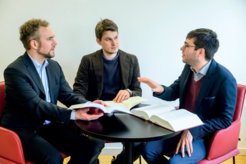
An essential part of the work in this Research Field is dedicated to identifying and collecting sources. We employ innovative methodologies, including oral history projects, digitisation and making private archives accessible. In doing so, we collaborate with European institutions (the Council and the Court of Justice of the EU) and the Historical Archives of the EU in Florence.
Legal Transfer in the Common Law World
As the British Empire expanded, English law was being introduced in very different parts of the world. Rules, principles and institutions from England were brought into force in regions and societies as diverse as Australia, Ghana, India, Jamaica and Singapore. In this Research Field, coordinated by Victoria Barnes, we enquire how this process unfolded in various places.
In many cases English law encountered local or regional traditions, both legal and non-legal. To what extent did these encounters differ from each other? Was there ever anything resembling the frequently invoked ‘unity of the common law’? Or did the law of England acquire a distinctive flavour in each territory, depending on the geography, the climate and the prevailing religious, moral and economic views of the inhabitants? And, finally, can we learn anything from the experience of English law for the broader debate on legal ‘transplants’ and, even more generally, legal development as such?
Initial research projects have focused primarily on the following regions: India, South East Asia, North America and the Caribbean. Specific case studies turn on different areas of law, including constitutional law, the law of contract, land law and intellectual property. Apart from substantive law, they consider the various modes of conflict resolution in colonial courts and other venues.
Informal collaborations have been set up with leading scholars from all over the common law world. The bi-weekly ‘Common Law Research Seminar’, established in late 2016, has drawn many of them to Frankfurt and has become a major forum for the exchange of ideas amongst scholars working in the field.
Private Law and Dispute Resolution in a Historical‚ Comparative and Transnational Perspective
Research into the history of private law has a long tradition in Frankfurt. For Helmut Coing, our Founding Director, it was the key task of the Institute, for he considered this area of legal history to be ultimately the ‘direct foundation of the contemporary system of private law’. Thus the Institute’s first flagship publication, an extensive handbook, was entirely devoted to the sources and literature of the modern history of private law, covering the early modern ius commune and the 19th century (Handbuch der Quellen und Literatur der neueren europäischen Privatrechtsgeschichte).
Today, the Institute’s research on the history of private law has become even more ambitious in four respects. Firstly, we analyse ‘legal’ history in close dialogue with social, economic and political history. Secondly, we examine ‘private law’ with a strong focus on how private law rights can be enforced and thus pay attention to the various modes of judicial and extrajudicial dispute resolution. Thirdly, we no longer limit ‘European’ legal history to the continental ‘civil law’ tradition: we include, as a matter of course, the history of the common law in Europe and legal developments in East Asia, South America and the Commonwealth. All these are intimately connected to the legal history of Europe but transcend it; in the Institute’s research, they are seen in the context of global history. Fourthly, we consciously link the history of private law to developments in contemporary private law, and thus connect it to the disciplines of comparative and transnational private law.
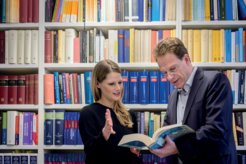
International collaborations in this Research Field have been on a personal, rather than an institutional level. Work on the six-volume Studies in the Contract Laws of Asia has brought together around 150 scholars from South, East and South East Asia. The Ius Commune Casebook on Contract Law was co-authored with three leading contract lawyers from England, France and the Netherlands.
Sources of Law and Legal Methods
Legal history cannot be studied without sources. These are often inaccessible or cannot be understood without a concomitant engagement with the methodological tools available to those who produced, interpreted and applied these sources in the past. We address these issues in the Research Field Sources of Law and Legal Methods. It aims to identify, catalogue and make available sources that were inaccessible to earlier generations of researchers as well as to provide the relevant tools and aids to study them.
Using repositories, publications and collections, sources are collated and edited in long-term projects, for example the collections of legal opinions (consilia) from medieval jurists. A census of 16th-century legal imprints seeks to provide a comprehensive listing and description of the entire legal literature produced during the relevant period, at the same time attempting to show how these works were disseminated throughout Europe. Another project seeks to uncover the complete manuscripts of the influential 14th-century jurist Baldus de Ubaldis. A more recent focus is on oral history, a key method of collecting sources in contemporary history, which is particularly relevant in the context of the Research Field Legal History of the European Union.
Achievements and Outlook
Needless to say, some of the projects straddle the boundaries of at least two of the four Research Fields. The above summary can hardly do justice to the diversity of the projects pursued in the Department with regard to regions covered, periods explored and methodologies employed. Work is pursued on territories ranging from the Bahamas to West Africa, Myanmar and China. Some researchers focus on the late Middle Ages, others on the European Commission in the 1980s. In terms of methodological approaches, we employ archival research, biographical studies, digital humanities, doctrinal history, history of concepts, intellectual history, oral history, palaeography and statistics, just to name a few. Nearly all our projects have a comparative, European or global dimension. It is a privilege to lead such a vibrant and diverse community of scholars hailing from nearly a dozen different jurisdictions.
In terms of scholarly output, much has been achieved over the past three years. Detail on the various publications can be found in the Annex to this Report. These include Donal Coffey’s path breaking two-volume work on the origins of the Irish Constitution, Emily Whewell’s study of British consular power in the borderlands of China, India and Burma and Insa Jarass’ prize-winning analysis of ‘private uniform law’, to single out just a few. I am also delighted to report that work on the final instalment of Coing’s Handbuch of sources and literature of the modern history of private law was finalised during the reporting period, almost 50 years after publication of the first volume !
The coming years will hopefully see us pushing ahead in all our Research Fields, with quite a few of the first doctoral and postdoctoral projects being concluded. With regard to the common law world, we aim to intensify our research on the Indian sub-continent, a region that presents particular challenges for legal historical work; a new project examines the interaction of English and Roman-Dutch law in British Guiana. Concerning the legal history of the EU, we hope to provide a first account of how to engage in research in a subdiscipline of legal history that has hitherto been uncharted, with a volume in the Institute’s methodica series. As to the comparative history of private law, a major focus will be on the continuation of the Studies in the Contract Laws of Asia. Work on sources of law and legal methods will be directed to the completion of the long-term projects on Baldus de Ubaldis and the census of 16th-century legal imprints.
We intend to continue and expand our collaborations with our many friends and partners at different institutions in Europe and beyond. Exciting opportunities for a further exchange of ideas have arisen with the establishment of the new Department of Marietta Auer, not least with regard to our work on private law and legal method. There is much more to be learned about European and comparative legal history, and we look forward to exploring them further.
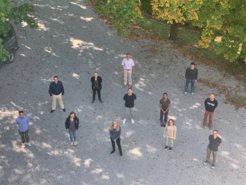
Stefan Vogenauer
Director
- Legal History of the European Union
- Legal Transfer in the Common Law World
- Private Law and Dispute Resolution in a Historical, Comparative and Transnational Perspective
- Sources of Law and Legal Methods
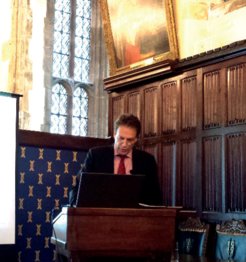
Stefan Vogenauer’s research has been intimately linked to the various Research Fields of the Department of European and Comparative Legal History. A particular focus has been the ongoing work on the six-volume Studies in the Contract Laws of Asia, co-edited with Mindy Chen-Wishart from the University of Oxford and published with Oxford University Press. This is an ambitious attempt to map out the history and the present state of the contract laws of 13 different jurisdictions in South, East and South East Asia. Together, these account for nearly half the world population, ranging from India to the Philippines. The project is interesting with regard to legal transfer in the common law world, as it examines the borrowing from English law in jurisdictions as diverse as Hong Kong, India, Malaysia, Myanmar and Singapore. However, it also has a strong European comparative element because all the other contract laws concerned can be traced back to either French or German law. Two volumes of the Studies were published during the reporting period [Chen-Wishart, Loke, Vogenauer, Formation and Third Party Rights, 2018; Chen-Wishart, Vogenauer, Contents of Contracts, 2020], and two further ones were edited with a view to publication in 2021 (on contractual validity) and 2022 (on termination and the adaptation of contracts in the light of supervening circumstances).
The last mentioned topic, contractual adaptation, has acquired particular relevance with regard to the COVID-19 pandemic, which has made it impossible or excessively onerous for many contractual parties to perform their obligations. This issue was addressed with a view to transnational sales law [McKendrick, Vogenauer, Supervening Events, 2020] and with a series of articles on force majeure-, hardship and similar clauses [Vogenauer, Härteklauseln, 2021]. It also features heavily in the third edition of the leading student textbook on comparative contract law [Beale, Fauvarque-Cosson, Rutgers, Vogenauer, Ius Commune Casebook, 2019].
The latter publication, with its focus, inter alia, on the development of EU regulations and directives in the area of private law, also contributes to the Research Field Legal History of the European Union. However, in this area, Stefan Vogenauer’s work was mostly directed to the preparation of a volume featuring a number of key biographies of early protagonists of EU law at both the national and the supranational level. The biographical approach also took centre stage in a special issue of the Journal of Legal History [Barnes, MacMillan, Vogenauer, On Legal Biography, 2020], in the institutional collaboration with Humboldt Universität Berlin on the F.A. Mann project and in the 2018 Annual Lecture of the Selden Society, which examined the lives and the work of three British translators of the writings of Savigny.
Finally, a monograph on the difficulties arising from the use of the English language in contracts governed by German law was mostly addressed to a practitioner audience. They were surprised to learn that many of the idiosyncrasies of modern English legal language cannot be understood without reference to medieval law French, the history of drafting deeds and the doctrinal origins of English contract law [Triebel, Vogenauer, Englisch als Vertragssprache, 2018].
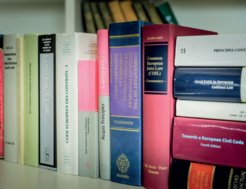
Mapping Out, Comparing and Tracing the Origins of Asian Contract Laws Two further volumes of the six-volume Studies in the Contract Laws of Asia were published during the reporting period. The series is edited by Professors Mindy Chen-Wishart (University of Oxford) and Stefan Vogenauer. Published with Oxford University Press, it provides an unprecedented account of the contract law regimes of selected Asian jurisdictions, including the continent’s major centres of commerce, on which so far only very limited critical commentary has been available in the English language. The coverage extends to Cambodia, China, Hong Kong, India, Indonesia, Japan, Korea, Malaysia, Myanmar, the Philippines, Singapore, Taiwan, Thailand and Vietnam. 
All volumes pursue three objectives. Firstly, they intend to gather reliable information on the contract laws of the jurisdictions involved. Secondly, they attempt a first tentative comparison of these contract laws. Thirdly, they wish to shed light on the relationship between the Asian laws involved and their respective European source jurisdictions. The third of these objectives adds a strongly historical dimension to the comparative exercise. It requires a nuanced study of the legal transfers from English, French and German law that can be observed to various degrees in all the Asian jurisdictions covered in the series. The various volumes deal with specific areas of contract law, including remedies, formation, content, parties, defects of consent, change of circumstances, illegality and public policy. Each volume features a joint introduction by the editors that specifies the research agenda, in-depth essays by leading scholars and commentators from the relevant jurisdictions and a concluding comparative discussion of the similarities and dissimilarities observed. The volumes on Remedies for Breach of Contract, Formation and Third Party Beneficiaries and Contents of Contracts were published in 2016, 2018 and 2020, respectively. A volume on Invalidity is in preparation for 2021, another one on Ending and Changing Contracts for 2022. |
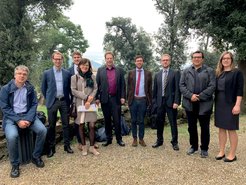
Stephen Aranha
Doctoral Student
- Legal Transfer in the Common Law World
- Subjects. Status and suffrage in the Bahamas during the past 100 years
Through an analysis of archival sources, constitutional texts and election laws, this project investigates to what extent colonial subjects and, later, citizens of an independent Bahamas were empowered to participate in political processes. When the Bahamas’ first parliament convened in 1729, the franchise was very limited; the first election that could be described as adhering to the principle of one-person, one-vote was in 1967. The expansion of the suffrage was the result of battles fought between three fronts: the colony’s white oligarchy, colonial administrators, and the broad masses of the Bahamian population and their political vanguard.
Important steps in the reform process towards a democratic suffrage include the introduction of the secret ballot, the removal of property qualifications and women’s suffrage. At times, the oligarchy compensated for steps of democratisation with measures that reduced their democratic potential. This history is intertwined with political developments of the time – the global process of decolonisation in general, and the minutiae of this process in the Bahamas in particular. Bahamian historiography has focused on the socio-political aspects of this so-called ‘Quiet Revolution’ and defined its timeframe as about two decades. This project extends the timeframe to include the early twentieth century and the present. Shifting the focus towards constitutional and other legal developments will demonstrate that this revolution was never finished, but rather abandoned once political power had been wrested from the white minority. The result could be described as an independent nation of dependent subjects.

Philip Bajon
Researcher
- Legal History of the European Union
- European law and the rise of the EC/EU Council (1958-1993)
- Key biographies in the legal history of the European Union (1950-1993)
- The legacy of the Luxembourg Compromise (1966–1986)
My research in the period under consideration is centred around three different projects. The first project, European law and the rise of the EC/EU Council (1958–1993), is a reconceptualisation of the legal and institutional culture of the European Union from the 1950s through to the early 1990s, with two forthcoming publications on intergovernmentalism and culture. This project analyses, for the first time, why Member States of the European Communities have been seen as relatively passive with regard to the gradual establishment of the constitutional case law of the European Court of Justice (EJC) from the 1950s through to Maastricht Europe. The project not only fills a gap in the recent historical and sociological literature, it also serves to test longstanding claims in law and politics literature about the obvious paradox between rising intergovernmentalism and the increasing legal integration promoted by the ECJ. A split in the Council over the ECJ and its constitutional case law was the key reason national governments did not curb the Court nor codify its constitutional case law. The project furthermore demonstrates that the rise of intergovernmentalism in the EC, which culminated in the Maastricht Treaty, led to a rejection of both the federalist aspirations of the Commission and the codification of the constitutional legal order developed by the ECJ, although Member States did accept how the latter worked as a basis for the Single Market.

The second project, Key biographies in the legal history of the European Union (1950–1993), focuses on biography in the legal history of European unification. It originates from a conference held in the summer of 2018 at the MPIeR. The project addresses a wide audience of historically informed lawyers, legal historians, as well as historical and social science scholars of Contemporary Europe. An edited volume will appear in 2021 which will contribute to the development of the intellectual history of the field, focusing on the development of ideas and doctrines. At the same time, it will explore the links between social practices and the broader context of law and legal thinking.
The third project, The legacy of the Luxembourg Compromise (1966– 1986), examines the slow transition of the EC from a culture of consensual decision-making to the practices of majority-building and voting, which is regarded as a major trend in the cultural and institutional history of the EU. The project focuses on Member States’ initial resistance to this move towards voting that continued until at least the early 1990s. It will lead to a monograph to be published in 2021–22.
Victoria Barnes
Researcher
- Legal Transfer in the Common Law World
- The evolution of corporate governance mechanisms in the Anglo-American world
This project traces the evolution of doctrines that regulate corporate governance. In recent decades, English corporate law has moved towards a European style of law making. The Companies Act 2006 constituted a novel attempt to codify the rules surrounding directors’ duties. Hitherto, a director’s responsibilities were defined by the common law. Most significant here are Carlen v Drury (1812) and Mozley v Alston (1847). They are used to support the proposition that courts will not intervene in corporate governance disputes, unless there is strong evidence of fraud [Barnes, Mozley v Alston, 2018]. As courts were reluctant to intervene, shareholders looked to internal mechanisms to control corporate management instead [Barnes, Newton, Formalising Credit Markets, 2018]. In the United States, this rule appears in a different guise. How did this common law doctrine develop and then diverge?
This project emphasises three key factors as drivers for legal change: (1) the importance of individuals, particularly their background and socialisation, which both influenced their view of legal rule; (2) legal literature as a crucial mechanism for the diffusion of legal ideas; and (3) the importance of shared institutions as a way of harmonising law.
In this case study, doctrinal innovation is attributed to Nathaniel Lindley (1828–1921), who travelled to France and Germany and sought to emulate what he saw as a continental way of legal writing. His view of corporate regulation was otherwise typical in Victorian Britain [Barnes, Lord Lindley, 2020]. Nathaniel Lindley’s treatise on the Law of Partnership (1860) was crucial to this process of legal change. In jurisdictions that lacked or disregarded their own body of legal scholarship, texts written by English lawyers, such as Lindley, took precedence [Barnes, Whewell, English Contract Law, 2019; Barnes, Legal Transplants, 2020]. The highest court of appeal in the then British Empire was the Judicial Committee of the Privy Council. Lord Lindley’s vision of law was embedded into the common law by the Privy Council judgment in Burland v Earle (1902). As the United States had broken away, it did not follow contemporaneous developments in English law. Yet, as tenets of earlier English law had been so carefully embedded, lawyers there could not remove these rules so easily [Barnes, Shareholder Primacy, 2020; Barnes, Shareholder Rights, 2020].
Roman-Dutch law and the common law world Casebooks on contract law are plentiful. For early examples of how cases and those writing about them contributed to doctrinal development and instigated legal change, one might look to John Smith’s Leading Cases, first published in 1837. Others followed the same format of picking out individual cases which were felt to be illustrative of a common law rule. Christopher Langdell, pioneer of the case study method at Harvard, published Cases on the Law of Contracts in 1871. In Leading Cases in the Common Law, published in 1996, Brian Simpson examined nine cases. A more recent development is the series of edited collections called Landmark Cases in.... One might notice that the texts mentioned thus far have been from common law jurisdictions. 
Portrait of Christopher Columbus Langdell by Frederick Porter Vinton, 1892
The research project Roman-Dutch law and the common law world, pursued by Victoria Barnes (coordination), Niels Pepels and Stefan Vogenauer, contributes to this well-established body of literature. However, it brings with it a new approach. Rather than focusing on describing, analysing or challenging the linear development of the common law, this study engages in a comparative method. It examines cases in jurisdictions where English law intersected with Roman and Roman-Dutch law. It focuses principally on shedding light on key cases in the contract law of Guyana and Sri Lanka. These colonial jurisdictions were often considered as the recipients of ideas from the metropole. Despite being distant from each other, these jurisdictions were linked by a shared legal background. They blended Roman-Dutch and English law, although in the 19th century, Guyana (British Guiana as it was then known) and Sri Lanka (Ceylon) were formally part of the British Empire. This project, therefore, not only compares the law being made in these mixed jurisdictions to that of England and the Netherlands, but also to each other. It considers how contract law developed in these jurisdictions. What were the competing influences of Roman law, Roman Dutch law and English law on doctrinal thought? This study does much to showcase the legal trends, unpick the comparative similarities and differences, but it ultimately explains why Roman-Dutch law persisted in some jurisdictions but was extinguished in others. It contributes to debates on the importance of culture, ethnicity and moral values of society (and their relationship to legal rules), the training and socialisation of those in the legal profession, and the embedding of judge-made law and stare decisis as a tool for eroding the structure of the civil law. |
Sean Bottomley
Former Researcher
- Legal Transfer in the Common Law World
- Institutional change and property rights prior to the industrial revolution: the case of wardship in Britain, 1485–1660
Under the influence of institutional economics, a consensus has emerged on the importance of the balanced state: one that is strong enough to fund and provide a legal framework enabling market exchange and security from internal and external predation, but which is constrained from undermining the security of private property rights. The formative example is England, where it is claimed that a balanced state emerged after the Glorious Revolution, leading in turn to the Industrial Revolution.
This account is controversial. It is widely accepted that property rights (certainly in land) have been secure since at least 1540. It is in this context that the project examines royal wardship in Britain from 1485 to 1660, a topic that has been largely neglected by historians since the 1950s and has never been the subject of an economic history. Beginning with Henry VII, the English Crown strained to re-establish its archaic, prerogative rights to ‘wardship’. These included the right to take temporary proprietorship of freehold lands held of it by certain feudal-military tenures which had descended to an underage heritor (the ward) upon the death of their ancestor. It also included the right to take physical custody of the ward until they reached the age of majority and, when they were unwed, to decide who they would marry.
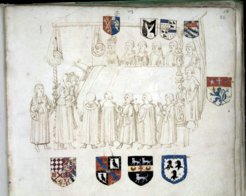
Three main points have emerged from the project so far. Firstly, the Crown’s re-imposition of wardship served to undermine property rights. Most commonly, the Crown sold wards and their lands on to third parties, acting as guardians. Guardians seldom had any incentive to take care of the estate, rather woods were chopped down, lands were over-cropped and buildings torn down for materials. It is partly in this context that Blackstone’s assessment of the Tenures Abolition Act (1660), which abolished wardship and the feudal-military tenures which underpinned it, as the ‘great[est] acquisition to the civil property of this kingdom than even Magna Carta’ can be understood. Secondly, the incidence of wardship was such that it had tangible economic consequences. For instance, land held by feudal-military tenures sold at a 10 percent discount relative to those tenures that did not entail wardship (socage) – significant in what was still a predominantly agrarian economy and where land was the pre-eminent asset and store of value. Thirdly, wardship is indicative of wider systemic failings of the early modern English state. It might have been an immensely productive source of revenue, but due to maladministration and the malfeasance of its officers, only a very small proportion of potential revenues actually accrued to the Crown.
Matilde Cazzola
Researcher
- Legal Transfer in the Common Law World
- Philanthropy, administration and the law in the 19th-century British Empire
The 19th century witnessed the increasing influence of philanthropists and philanthropic discourses on British imperial policies, most notably during the 1830s, with the abolition of the slave trade and slavery, the beginnings of Christian evangelisation in India and the establishment of protectors of indigenous peoples in Australia, New Zealand and the Cape. But philanthropic concerns had an impact inside the boundaries of Britain, too, as the same men and women who campaigned for emancipation, proselytisation and protection abroad often sat on the committees for the relief, schooling and nursing of the metropolitan poor and labouring classes at home.
This project assumes that disciplining the poor and labourers within and ‘improving’ the colonised without were two faces of one and the same set of social concerns. It therefore investigates philanthropy not as a private, moral relation between the wealthy and the needy, but as a branch of British imperial administration, with a public relevance and a transnational impact. By lobbying the Houses of Parliament and the Colonial Office, philanthropists influenced public policies and legal and legislative processes on a pan-imperial scale. They prompted the establishment of parliamentary select committees and commissions of inquiry, and ensured the approval of new, epochmaking pieces of legislation.
This project investigates how philanthropic ideas of humanness and reform were incorporated into – and most often disavowed by – the languages and practices of British imperial administration. To this end, it analyses a select number of influential philanthropists, transnational philanthropic groups and prominent colonial governors who interpreted their tenures as associated with a moral and ‘civilising’ responsibility. By surveying the relevance of the same set of social problems and of similar philanthropic solutions in different and distant spaces, this project will shed light on the interconnectedness of the British imperial framework from a transnational and comparative perspective.
This project aims to assess philanthropy as a key function of the 19th-century British imperial governance as it bent universalistic principles to the local and transnational need for social order. To ‘love humans’ meant, in fact, to govern and discipline them, while this disciplinary mission made an extensive use of the law.
Donal Coffey
Former Researcher
- Legal Transfer in the Common Law World
- From unitary legal system to multipolar international organization: the legal history of the Commonwealth of Nations in the Inter-War Years
This project concerned the constitutional development of the British Empire in the period leading into decolonisation. It specifically considered the relations between the self-governing parts of the British Empire, which made up the British Commonwealth of Nations, and the metropole. The project was pursued using a comparative approach. It drew on archival sources from each of the relevant jurisdictions to create a lattice of constitutional understanding, eg by using Canadian sources to shed extra light on the British interpretation of Irish legal liabilities in 1932. At the time, significant questions were raised about the correct forum and source of law that would be used to govern disputes between the various countries, eg should it be constitutional or international law [Coffey, 1930 Tribunal, 2019].
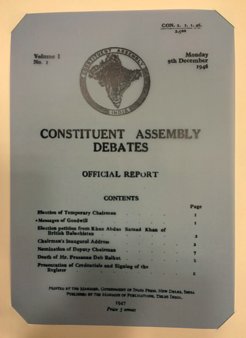
The questions raised at the time were fundamental to the legal structure of the Empire itself. A basic question – is it possible to leave the Empire and, if so, how? – was the subject of sustained debate over a period of 20 years until decisively settled by the Burmese independence movement [Coffey, Secession, 2018]. This, in turn, led to a change in the nature of the Commonwealth in order to incorporate republican India.
A particularly difficult member of the Commonwealth, at least in the eyes of the metropole, was the Irish Free State, whose constitutional changes in the 1930s sought to drive a wedge in the constitutional fabric of the Empire. This culminated in the removal of the Crown from the Constitution of the Irish Free Station [Coffey, Constitutionalism, 2018] and the drafting of a new Constitution [Coffey, Drafting, 2018].
By drawing attention to the multipolar nature of the Empire, and of law within the Empire, it was demonstrated that legal advances often occurred first in the periphery, although this was uneven between the various peripheries, before being adopted by the metropole.
Vincenzo Colli
Researcher
- Sources of Law and Legal Methods
- Census of the opera of Baldus de Ubaldis (1327–1400)
The research presented here focuses on Medieval juridical literature, its composition and dissemination. This literature was devoted to the utrumque ius, the civil and canon law, which constituted the European ius commune, the law common to Western Europe. The project investigates the sources of the ius commune.
Within the framework of legal literature and book production in the Middle Ages, the works of Baldus de Ubaldis (1327–1400), the most famous jurist of his time, became an important normative source of the ius commune. His commentaries and consilia spread throughout Europe in a large number of manuscripts and later in early printed books; indeed, they were still being published in the 17th century.
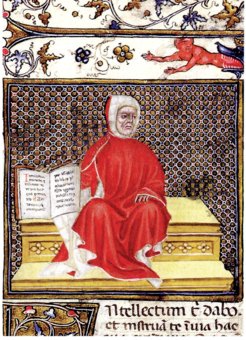
The project has succeeded in uncovering as many as 700 manuscripts that contain his works in whole or in part, which testifies to the wide dissemination of Baldus’s work. Prominent among these are the manuscripts of consilia, expert legal opinions given by Baldus at the request of litigating parties or judges (the project will provide a list of some 5,000 incipits of Baldus’s consilia). The Catalogue of the manuscripts has now been completed.
On the basis of the evidence provided by autographed copies of consilia which have been preserved, [Colli, Autografia, 2019], a number of other manuscripts of a special character have been discovered. These are manuscripts that actually belonged to the author himself and which he kept as his personal working copies. He subsequently modified and expanded the texts throughout his lifetime through many annotations and additions written in the margin. The discovery of these ever-changing ‘living texts’, from which the variants and multiple redactions in the later tradition of the works derive (also analysed in the Catalogue), makes it possible to construct an intellectual biography of this important medieval jurist, determining the order in which his works were compiled and the major dates in his intellectual development. This is the focus of the monograph which will conclude the project.
Justine K. Collins
Former Doctoral Student
- Legal Transfer in the Common Law World
- Tracing British West Indian legal transplantation: an analysis of the development and role of slavery legislation (1500s–1800s)
The thesis project examined the introduction of imperial laws and their transplantation within the relevant island colonies, issues of mixed legal systems and forms of early governance. Part 1 therefore laid out the basis of how transplantation began on a constitutional level prior to the genesis of the plantation societies and eventual economic boom. The subsequent parts of the thesis focused on various aspects of transplantation throughout the English slaveholding Empire via the progenitor Slave Code of Barbados. Part 2 specifically examined the origins of the Comprehensive Slave Codes of the British West Indies. It delved into pre-colonial English society to identify various laws and regulations adopted and adapted in the colonies and argued that transplantation was central to development within colonial legislation. Part 3 then analysed aspects of the enslaved as a property conundrum. Parts 4 and 5 focused on the period leading up to the end of slavery and the fall out that occurred after the apprenticeship system failed. The thesis concluded by addressing the breadth and depth of these ramifications post-emancipation by tracing the legal consequences of labour schemes, transactions, movements, transportations and stratifications therein. What each chapter revealed in terms of legal transplants within the British West Indies was that the English were not innovators in this regard; after all they met a region which was already colonised to a large extent by their European counterparts. The Barbadian Slave Code and its successors were simply mirrors of pre-existing laws and regulations. Close analysis of various metropolitan laws shows these linkages from the creation of the governance structures, the slavery codes, the courts, manumission laws, apprenticeships and vagrancy regulations. Each depicted the connection between the centre and its peripheries, showing that the English were great at improvising in areas somewhat unfamiliar but not totally foreign to them.
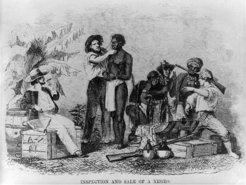
Ijeoma Chimeri Winner
Doctoral Student
- Legal Transfer in the Common Law World
- Administration of justice in West Africa: commercial relations in the colonial courts during the era of legitimate trade (1850–1930)
The aim of this research is to examine processes of normative production, the transfer of British legal institutions and the attitude of the new English-style courts towards commercial relations in the palm oil trade in West Africa. This study aims to provide a legal historical account of the events that characterised West African commerce and British merchant capitalism on frontiers of trade and in the administration of the colony after the transatlantic slave trade. It will fill the gap in the existing literature that does not comprehensively address the interaction between the transferred English legal institutions and legitimate commerce. Ultimately, it looks at West African trade in the post-abolition Atlantic economy and addresses the normative framework regarding commerce in the colonial era.
It aims to understand how the normative framework pertaining to commercial relations developed from the era of the courts of equity to the period of formal English legal systems. At the onset, this research will take into account historical, legal, economic and political aspects. It aims not only to present key research findings with analysis but also contextualise them thematically, theoretically and with a view to assessing possible avenues for the next phase of research in the field.

Insa Jarass
Researcher
- Private Law and Dispute Resolution in a Historical, Comparative and Transnational Perspective
- Sources of Law and Legal Methods
- Mandatory private law – tracing the influence of judges
- Private uniform law
Mandatory private law is of central interest in legal scholarship for many reasons. As legislators readily make use of mandatory norms to implement regulatory interests and courts usually apply mandatory rules ex officio, they require increased attention. Private parties must comply with mandatory norms to conclude valid contracts. Equally, mandatory private law has attracted the attention of legal theory, as the distinction between mandatory and non-mandatory law defines the degree of individual freedom in a legal system. Hence, it touches on crucial debates about the content, extent and raison d’être of private autonomy.
Because of the recent steady increase in mandatory private law norms, there has been criticism of national and European legislators in scholarship. In contrast, little attention has been paid to the role of the courts in the creation and development of mandatory private law and the associated legal doctrinal consequences. This is peculiar as in practice it is not only up to the courts to decide how mandatory norms must be interpreted, but often also whether a norm has a mandatory character at all. This raises questions about judicial law-making and a potential for conflict with fundamental constitutional principles.
From a historical and comparative law perspective, the research project aims not only to question the legality of this development but also to analyse the doctrinal and methodological consequences of the creation of mandatory law by judges. This study employs an empirical case law analysis of mandatory norms in various areas of private law as its methodological approach.
The second project undertaken in this period relates to Private uniform law. The national fragmentation of commercial law has always been perceived as a barrier to international trade. Therefore, it has not only been nation states that have tried to create legal unity through international treaties, private actors have also created non-state rules to this end. The classification of such nonstate rules and regulations presents challenges for our understanding of legal doctrine and legal sources.
As a result, this project established the concept of ‘private uniform law’. Based on the functional conditions of such law, private uniform law is defined as an independent doctrinal category that links certain facts of a case with specific legal consequences. The reasoning is based on an empirical analysis of English and German case law on selected non-state rules and regulations [Jarass, Privates Einheitsrecht, 2019].
Thorben Klünder
Doctoral Student
- Legal History of the European Union
- Rechtsgemeinschaft – semantic struggles about a key concept of European Law
My research is mostly focused on a conceptual history of the term Rechtsgemeinschaft, which is also the topic of my PhD project. The expression Rechtsgemeinschaft has been popular since the 1960s. The term was particularly associated with the idea of pro-integration policies. For decades, the fact that the EEC – and later the EU – was a Rechtsgemeinschaft, was tacitly taken as given. Now, as there is a perceived crisis among some legal scholars concerning European law and the controversies regarding the project of furthering European legal integration, the term is being called into question. Is Rechtsgemeinschaft still a fitting description of the EU both as it is and as it might aim to be in future?
Methodologically, I combine several historical semantic approaches, such as Koselleck, Wittgenstein and Skinner. As with all influential concepts, Rechtsgemeinschaft carries a lot of implicit meaning that can only be explained within the context of the contemporary debates in legal theory. As a study of legal semantics can gain much from exchange with legal theory, I have given seminars at the Goethe-Universität Frankfurt on legal theory and legal philosophy. I also contributed a comment to the Institute’s Jour Fixe, when Thomas Vesting presented his recent book Staatstheorie to engage in a dialogue between legal theorists and legal historians. A particular challenge is the translation of the term Rechtsgemeinschaft, which I have tackled in presentations in Luxembourg, Florence and Seoul.
The case study allows us to map the term’s changeability in debates on integration. In this way, this research project is a contribution to the incipient self-historicisation of European law.
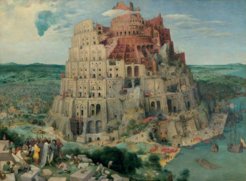
I have published some of my results on a widely read blog for German constitutional law [Klünder, Was ist die europäische Rechtsgemeinschaft?, 2020] and also an English translation, which is more accessible for an international audience [Klünder, What is Rechtsgemeinschaft?, 2020].
Jasper Kunstreich
Researcher
- Sources of Law and Legal Methods
- History of legal scholarship within the Max Planck Society
This project is part of a bigger research network. The Institute endeavours to publish an edited collection of six individual studies of the histories of the six law-related Max Planck Institutes (MPIs) that were founded before 2000. Six scholars from different German universities, each of them acquainted with the respective MPI, have been invited to contribute. At the same time, the project forms a subpart of the Berlin-based research programme on the history of the Max Planck Society (GMPG), to which it contributes a synthesising analysis of the ‘legal’ within the Society. Another layer of collaboration included collecting material from different archives, including the Bundesarchiv, the local archives of federal ministries and the Länder, collections held by the individual Institutes and the Max Planck Society’s Archive in Berlin-Dahlem. Together with the latter, the research network has also built an extensive database that enables scholars to quickly access material, make cross references between different institutes or sections of the Society and identify network effects.
In addition to coordinating cooperation between the individual authors and liaising with the Berlin-based research programme, I also embarked on an overarching study of legal scholarship within the Max Planck Society: how did it differ from legal scholarship conducted at universities? How did Max Planck lawyers contribute to the shape and functioning of the Max Planck Society? What were their interactions with other institutions, in particular with the German Justice Ministry and the European Commission and civil service? The first three post-war decades witnessed a sustained growth of legal scholarship within the Max Planck Society with a focus on comparative and international law. This is the period during which the so-called ‘legal cluster’ emerged within the Max Planck Society; by 1966 it was well established. The cluster was characterised by complementarity – the respective institutes focused on different fields each and avoided direct competition – and strong continuity. They also provided a sort of semi-public good: their specialised libraries became reference points for legal scholars, their researchers regularly provided expert opinions for German courts. Further research looks into the changes that took place subsequently as the academy became increasingly international while their work was transformed by digital means.
Anselm Küsters
Doctoral Student
- Legal History of the European Union
- The influence of ordoliberalism on the development of European competition law as mirrored in European Commission publications (1952–2018)
Ideas matter. Different perspectives on thrift and competition shape the economic policy discourse on reforming the EU, while conflicting concepts of neutral monetary policy and the rule of law dominate the legal debate. This opens up the possibility of investigating the extent to which such nationally or culturally hegemonic narratives – be it in the form of frequently cited ‘lessons from the past’ or dominant schools of thought – have historically influenced economic policy and law in a European context (conceptual overview: [Küsters, Narrative, 2020]).
In order to do so, the rapidly growing set of instruments developed in the field of Digital Humanities can be used. In particular, corpus-linguistic methods allow for the clarification of the spread of narratives on the basis of word frequencies and correlations, network analysis, and algorithmically estimated topics (methodological overview: [Küsters, Volkind, Wagner, Digital Humanities, 2019]).
On the basis of these methods, my ongoing PhD project traces the ordoliberal influence on EU competition law by examining decisions and publications of the European Commission. Related work shows that a cultural preference for price stability and balanced budgets played a role both in the writings of German economic experts during periods of perceived domestic crisis [Küsters, Search, 2019] and in speeches given by ECB board members during the Eurozone crisis [Küsters, ECB, 2018]. Meanwhile, an analysis of the German medial discourse on Southern Europe finds that popular narratives do not have to be stable over time [Küsters, Garrido, PIGS, 2020].
Overall, this mixed-methods approach makes both assumptions and results intersubjectively verifiable and promises new answers to contested questions in legal history. It also strengthens the discipline’s connection with economic history [Barnes, Bottomley, Küsters, Economic History, 2019] and AI research [Küsters, Artificial Intelligence, 2020].

Jan-Henrik Meyer
Researcher
- Legal History of the European Union
- A transnational history of European environmental law
Why and how did the European Union (EU) – an international organisation primarily devoted to peace and prosperity in Europe through market integration – become the leading lawmaker on the environment in Europe? Which actors were driving this process and established a new system of law? How did European environmental law change over time? These are the key questions of this research project. The underlying assumption is that transnational flows of ideas and the transnational interaction of a diversity of actors were key. The core hypothesis is that the direction of these flows changed over time. While the early makers of European environmental law – at a time when even the concept of the environment was not fully established – drew on precedents and concepts from outside, over time, European environmental law was increasingly exported, and became a point of reference internationally.
The project draws on a variety of historical sources from national, EU and civil society archives, published records, legal scholarship and oral history sources. Methods include not only the qualitative analysis of texts, but also Digital Humanities approaches, notably the analysis of the emerging ‘field’ (Bourdieu) of European environmental law.

The most important results so far explore the contribution of different actors to European environmental law. Even before it was directly elected in 1979, the European Parliament (EP) placed the environment on the European institutional and public agenda [Meyer, Responding, 2020], and demanded binding EC legislation. MEPs specified quite clearly what Treaty legal bases could be used, as highlighting in a contribution to a forthcoming special issue on the European Parliament. A contribution to a history of the European Commission, based on numerous oral history interviews, as highlighted its central role in framing environmental law, and the varying role of lawyers within the Directorate General (DG) Environment. It also underscored how global trends and implementation problems changed its approach to law-making [Meyer, Environmental Policy, 2019]. A forthcoming biographical chapter on a Commission environmental lawyer who used the courts to advance implementation contributes to the growing interest in biography among legal historians. Supranational activism has not always led to legislation, as a case study and talk at the European Environmental History Conference 2019 emphasised, highlighting the instructive potential for legal history in analysing such ‘failures'.
Aleksi Ollikainen-Read
Researcher
- Legal Transfer in the Common Law World
- Development of documentary transfer and transnational trade in Southeast Asia
This research concerns the doctrinal history of English commercial instruments, and its interplay with mercantile custom. The common narrative among English commercial lawyers is that English law was too rigid in the 17th century and needed a jolt from mercantile practice to develop into the global commercial law that it is today. This project aims to show that this view is simplistic and misunderstands how the common law borrows content from other dispute resolution processes.
In order to do so, the research engages with several related issues in broadly two themes. The first theme concerns how the law of commercial instruments was first born out of mercantile practices in Britain and continental Europe. This project builds on the seminal work of JS Rogers (1995) by adding doctrinal detail regarding what the specific structural issues within the common law were that have since been interpreted as the common law’s ‘rigidity’. The second research theme relates to how these doctrines were then refined and adjusted when the British Empire pushed into South and Southeast Asia and the law came into contact with local trade practices.
Under the first theme, rich areas of inquiry have been unearthed by tracing the historical origins of certain doctrines that could inform not just historical debates, but advance our doctrinal and theoretical understanding as well. Once we understand the internal ‘mindset’ of the common law, the reluctance to accept new sales law in fact shows itself to be a sensible concern for maintaining boundaries between doctrines, limiting and directing parties’ disputes, and managing the amount of evidential material the courts had to consider. It is from these prosaic procedural concerns that the dominant commercial law of the modern world was born.

Under the second theme, a picture is emerging of differing trade practices and factual situations which then refine the content of the common law. English judges’ developing awareness of novel factual problems in trade disputes (eg differing customs, cultures or even languages) began to feed into a more responsive commercial doctrine. This already suggests that legal knowledge transfer was not just from London to the colonies, but involved a much more nuanced recognition of interconnected trading hubs and the admission of customary normative content
Douglas Osler
Researcher
- Sources of Law and Legal Methods
- A census of 16th-century legal imprints
While it has long been recognised that the printing revolution of the 15th century had profound effects on the production and dissemination of knowledge in Europe, not least in the field of law, our information on the vast book production of European publishing houses remains unsatisfactory. Only the incunable period up to the year 1500 can be said to be adequately described. However, in the last decades various projects have begun to document the printing production of Europe in the succeeding century.
These projects have proceeded along national lines. From the point of view of the legal historian, however, this approach is seriously anachronistic. In the 16th century, legal literature knew no such boundaries as those constituted by the modern nation state. The ius commune was a law common to all of continental Western Europe, written in a single European language, Latin. What were effectively extraterritorial printing centres, such as Venice, Lyon, Frankfurt, Antwerp and Geneva, permitted the distribution of legal scholarship throughout Europe and ensured that jurisprudence remained a supranational, European enterprise.
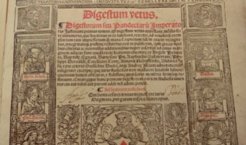
The project Census of 16th-century Legal Imprints seeks to provide a bibliography of the juristic production of the printing presses of continental Europe from 1501 to 1600. Its objective is the creation of a data bank in which surviving copies of legal editions held by individual libraries are brought together in a single union catalogue. Building on the information provided by traditional published library catalogues, attention has latterly been turned to the OPACs of the great German libraries. The comprehensive Census descriptions provide a key to interpreting the sometimes elementary information in these catalogues. This has been supplemented by visits to the libraries to inspect rare items and resolve any queries.
The Census will thus make available for the first time a systematic register of the extensive juridical holdings of the great historic German legal repositories: Freiburg, Tübingen, Heidelberg, Göttingen, Halle, Rostock, Gotha, Erfurt, Wolfenbüttel, Berlin and Munich. This should also reveal the patterns of dissemination of law books in Europe in these centuries.
Niels Pepels
Researcher / Former Doctoral Student
- Legal Transfer in the Common Law World
- Copyright and the making of a nation: the transfer of copyright law from England to the United States
On 7 January 1783, the artist John Trumbull, known as the ‘Painter of the Revolution’, addressed the American public in an open letter. He stressed the significance of literary property to reward American authors, in part because a ‘literary reputation is necessary to complete the national character’ in order to unite the public. In the first State of the Union Address on 8 January 1790, President Washington weighed in on the copyright debate, proposing that public happiness was to be achieved through promoting science and literature. This would also enable people to know and value their constitutional rights.
As Washington argued, the value of copyright lay and still lies in its capability to advance knowledge. He reasserted the importance of the intellectual property clause in the US Constitution. This clause laid the foundation for federal copyright law in the US, which in turn was heavily influenced by English copyright law. Over a period of seven years, Trumbull and Washington, along with other important politicians and literary figures such as James Madison, Joel Barlow and Noah Webster, proposed legislation on copyright. Why did these men think copyright law was important to the building of the early American republic? Furthermore, how did it come to pass that early US copyright law was based on English law?
This project chronicles the historical process of enacting US copyright law from 1783 until 1834, as well as tracing its English foundations – mainly the 1710 Statute of Anne, the first law to extend copyright protection to authors. It challenges current understandings of the origins of US copyright law and argues that this field of law was used to create a distinct American identity. While the English foundations of federal copyright law are well documented, relevant literature has overlooked the influence of state copyright statutes. Most states adopted copyright statutes between 1783 and 1786, all based on the Statute of Anne. The framers of the Constitution, seeing diverse state copyright laws, created a uniform body of copyright law on a federal level. Between 1783 and 1834, state legislators and Congress via statutory law, and courts via case law, continuously transferred copyright law from England to the US. Thus, early US copyright law relied heavily on English copyright law to protect and advance knowledge in the process of creating a national identity.
Sigfrido M. Ramírez Pérez
Researcher
- Legal History of the European Union
- An oral history of the Court of Justice of the European Union
- A history of EU lawyers in European institutions
- EU law and constitutional law in Southern Europe: a comparative perspective
- Writing the history of competition law in the European Union, 1945–2003
- The history of Social Europe and EU labour law
The research activities developed in 2018–2020 clustered in five research projects investigating different aspects of the legal history of European Union law.
The first research project, An oral history of the European Court of Justice, carried out with Stefan Vogenauer and the assistance of Dimitri Zurstrassen, was a pilot history project on the legal-administrative history of the Court of Justice of the European Union in Luxembourg. It involved a consortium of lawyers and historians who were brought together in a workshop in 2018 with the aim of defining the oral history methods to be used for this project. The second project, A history of EU lawyers in European institutions, deals with the role of supranational legal actors in the making of EU law, with a particular focus on the legal services of EU institutions. This was presented at two conferences in 2019 in Frankfurt and Brussels, which brought together specialists and lawyers from EU institutions with a particular focus on oral history methods and legal biographies. The third project, EU law and constitutional law in Southern Europe: a comparative perspective, dealing with the relationship between EU law and constitutional law, focuses on the role of non-institutional European actors in the adoption of EU law in a comparative perspective with a focus on southern European countries.

The Italian case study looks at the role of the Italian Association of European Law (AIGE), which was presented at the conference celebrating the AIGE’s 60th anniversary in Rome in 2018. The Spanish case study is part of a Spanish research project dealing with EU enlargement to include Spain and Portugal, and was presented at two conferences in 2019 in Barcelona and Lisbon. This comparative perspective was the core objective of the DAAD 2019 conference, which included a conference on the comparative constitutional history of Italy, Germany and Spain in a European perspective. The fourth and fifth projects deal with the history of EU law in two policy fields: competition law and social labour law. The project on EU competition law, Writing the history of competition law in the European Union, 1945–2003, examines one century of European competition law in a comparative and transnational perspective in a co-edited volume with Brian Shaev (University of Leiden). This has been illustrated with publications on the impact of EU law on multinational companies in the automotive sector. The fifth project, The history of Social Europe and EU labour law, has been developed is tied to my role as coordinator of the working group panels of the European Labour History Network (ELHN) biannual conference. Its focus is on the role of European trade unions in the making of EU social and labour law.
Christoph Resch
Doctoral Student
- Private Law and Dispute Resolution in a Historical‚ Comparative and Transnational Perspective
- The presumption of completeness and accuracy of contracts in writing – Historical legal comparison and perspectives for the harmonisation of private law
This project focuses on the evidential significance of written contracts from a historical and comparative perspective. In many jurisdictions, written contracts have an absolute or at least superior evidential force regarding the completeness and the accuracy of their terms. What today sounds familiar even to a layperson was a tremendous legal change when introduced by statute in 16th-century France: the ius commune of that time considered witness statements as crucial for any proof before a court. The French development occurred at the time when the use of printed books became common and general literacy spread.
In the centuries that followed, similar legislation was introduced in England and several German territories. Comparisons of the interpretation of the French rule by courts and jurists with legislative drafts in England and Prussia bear strong evidence that their statutes were substantially influenced by the French model.
Adopting a historical and comparative perspective, the project also aims to shed light on current projects of legal harmonisation such as the Principles of European Contract Law. Curiously, there has been the suggestion of following contractual practice from the US, where the writing is protected through the use of merger clauses, by which the parties declare the writing to be their entire agreement. Case law analysis, however, shows that the application of such clauses is a frequent source of litigation which results in the implementation of numerous exceptions that are not reflected in the suggested rules. This research project is not limited to a purely doctrinal analysis. It is equally informed by a strong interest in the overarching historical topic of the change from an oral to a written culture in society and law and analyses policy considerations of courts and legislators from the 16th to the 20th century.
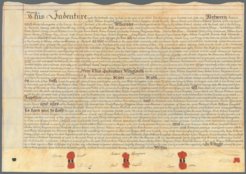
Philipp Schmitt
Doctoral Student
- Legal History of the European Union
- Minimum harmonisation: the development of a legislative technique in EU law
Legal harmonisation plays an important role in the European Union (EU). Its main aim is to develop a single market, but at the same time non-economic objectives must be considered. As national perspectives vary, the fundamental question remains: how much unification is necessary and how much flexibility, for example, by establishing minimum standards, is feasible? Analysing how and when different forms of harmonisation of national laws were developed allows for a better understanding of the changing character of the EU and its predecessors over the decades. Minimum harmonisation highlights the link between the fundamental question of the nature of the Union – neoliberal or social – with rather technical legal issues.
The tendency to allow for flexibility to foster integration despite national differences, such as minimum clauses and other forms of differentiation, played a role in Community law-making from the very start of integration. This finding challenges the established narrative that the Commission and the Council of Ministers initially – in a period of a now long-lost unity – only passed highly detailed directives without any flexibility. Instead, the period was characterised by contingencies and a lack of overview over the different areas of Community law and the techniques of harmonisation used.
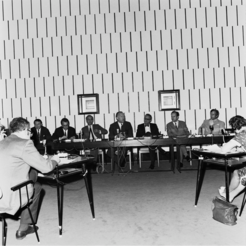
Archival research shows how in the late 1970s a more theoretical analysis commenced within the Commission’s Legal Service. Its officials collected the different instruments and disseminated these in legal publications. As the Community grew and its legislative activities spread to non-economic areas, such as environmental law or consumer protection, minimum harmonisation played a more prominent role. By opening the ‘black box’ of the Commission, it is possible to show how a market-focused liberal approach cherishing unification and a growing ‘social’ tendency clashed. The ‘spill over’ of these internal debates into the legal discourse then sparked scientific discussion on different harmonisation techniques
Emily Whewell
Researcher
- Legal Transfer in the Common Law World
- Tracing law across jurisdictions
The mid-19th to early 20th century was a formative period for the creation, reformation and extension of law across the British Empire. Bilateral treaties, metropolitan Acts and local regulations attempted to stretch British jurisdiction across the Caribbean, Africa, Asia and the Pacific. Whether to protect important economic zones, to limit the reach of other imperial powers or to catch fugitives, British imperial regimes attempted to demarcate the extent of their jurisdictions and clarify the nature of imperial legal power. This project has focused upon the legal practices of extraterritoriality, extradition and deportation in two broad regions of the world: Asia and the Caribbean. It has used case studies, legislation, newspapers and archival documents to understand how individuals, such as fugitives who transgressed frontiers, shaped British imperial jurisdiction and concepts such as nationality.
Imperial legal officials, such as consuls, also played a key role in creating and applying law across borders. They campaigned for, and implemented, British legal rights that defined the contours of British imperial power. Often they had careers that spanned across jurisdictions, taking legal ideas with them as they moved. Tracing their careers has helped to understand how they understood the laws they created, interpreted and applied. This research has made contributions to several fields: historiography of borderlands and frontiers, British Empire studies, China studies and Caribbean studies.
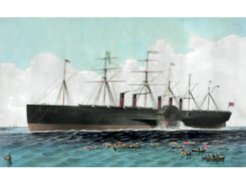
Published pieces on the project include a book publication [Whewell, Borders, 2020] exploring legal practices in the frontiers between China, Burma and India. Other publications include an article [Whewell, Mediators, 2020] examining legal mediators in the Burma-China borderlands in the early 20th century. Other articles have explored the role of fugitives in shaping legal regimes of extradition in the Caribbean [Whewell, Refuge, 2020] and the legal connections between India and Treaty Port China through political fugitives [Whewell, Deportation, 2020]. Finally, a co-written piece with Victoria Barnes explored the transfer of English contract law to extraterritorial courts in China during the late 19th century [Whewell and Barnes, English Contract Law, 2019]. These works demonstrate how law moved with various actors – such as fugitives and consuls – and how they shaped local and regional environments across borders.
Sarah Zimmermann
Doctoral Student
- Legal History of the European Union
- The emergence of European Union procedural law
Although the decisions of the Court of Justice of the European Union are studied intensively by lawyers, political scientists and historians, the procedural rules governing the Court and its decisions have attracted little attention in legal research.
The project seeks to answer the question of how the Rules of Procedure of the Court of Justice came into being. In this respect, it asks what the first procedural rules of the Court of Justice of the European Coal and Steel Community (ECSC) were, who laid them down, how they evolved during the first years of the European project and whether there were recognisable national or international influences.
Given that these procedural rules were, apart from the Founding Treaties, the very first legal provisions to be adopted by the Community, the project also seeks to provide an insight into the early Community decision-making processes more generally.
Using sources from the archives of the European institutions and the ministries of the founding states, the project examines the emergence of the procedural rules of the Court with a historical perspective to these legal and, more particularly, comparative questions.
The procedural rules of the Courts of the European Union are laid down in the Protocol on the Statute of the Court of Justice and in the Rules of Procedure of the Court. Work on the subject has so far shown that the first set of Rules of Procedure, dating from 1951, was drafted within only three months by the seven judges of the ECSC Court. Their first draft was very closely modelled on the Rules of Procedure of the International Court of Justice in The Hague. This changed, however, when it became increasingly clear that it was not a classic court under international law, which is why more and more rules from national civil and administrative procedures were incorporated into the drafts. Moreover, it is noticeable that there were very few arguments among the judges during the drafting of the rules. To what extent this can be attributed to a great similarity of the civil and administrative procedures in continental Europe will be worked out, based on a selected number of procedural rules.
Dimitri Zurstrassen
Former Researcher
- Legal History of the European Union
- Writing the history of competition law in the European Union (1974–1985)
- An oral history of the Court of Justice of the European Union
Work was carried out on two projects during the reporting period. The objective of the first research project was to analyse the genesis of the new ECSC competition law that emerged during the European steel crisis of the 1970s and 1980s and its evolution. It was part of the Institute’s work on the history of EU competition law. Using primary sources, the research examined how this new legal framework was constructed, the actors involved, the arguments justifying its development and whether it constituted a model for the regulation of EEC sectors. The results will be published in a chapter of a forthcoming book, as well as part of a PhD thesis on the evolution of EU industrial policy in the steel sector.
The oral history project of the ECJ was initiated in 2017 and is coordinated by Sigfrido Ramírez and Stefan Vogenauer in collaboration with the Historical Archives of the EU. Its aim is to collect testimonies of people working at the institution from 1951 to 1991. My primary tasks were participating in general coordination of the project, the collection of primary sources and literature about the institution and the preparation and organisation of interviews. I also took part in the organisation of the workshop ‘Oral History of the ECJ’, held at the Institute in 2018. The proceeding of this event will be published in 2021 in the Journal Rechtsgeschichte – Legal History.
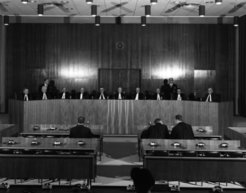
Max Planck Fellow Group
The History of European Union Labour Law
Thorsten Keiser
Max Planck Fellow

From the very beginning, the European Community, and later the Union, has been active in various fields of labour law. Different regulatory techniques of hard law and soft law can be observed. The Max Planck Fellow Group aims to understand these in a historical perspective and to reflect on them in their respective contexts of origin. Using archival materials, the first subproject will produce an overview that documents the regulatory emphasis of Union law in the area of labour in its supranational dimension and from a historical perspective. Parallel to this, a second project analyses these regulations in a bottom-up approach that takes the legal systems of the member states – not the Union – as its point of departure. While the first project will focus on the emergence and impact of supranational law, the second will highlight the interaction between national legal systems and European lawmaking. The resulting complementary perspectives on the development of European labour law reveal its specific characteristics: on the one hand, its roots in supranational compromise and, on the other, its adoption of certain normative patterns from the member states and thus its roots in European legal culture. The Max Planck Fellow Group will help to strengthen the existing network of research projects both at the Justus-Liebig-Universität Gießen and the mpilhlt.
The project’s activities began in summer 2020. A doctoral position was filled and located at the Max Planck Institute. Networking with various research areas at the Universät Gießen has taken place. In the course of the work, it has emerged that the thesis will focus on the legal history of European Union labour law in Germany and France. Situated within the second project, the thesis takes up a bottom-up perspective that emphasises socio-political and economic factors. Two further doctoral positions will be filled in autumn 2021. The thematic focus will be the history of labour law in the EU in general, as well as the history of anti-discrimination law in Southern Europe.
Anna Quadflieg
Doctoral Student Max Planck Fellow Group
Legal History of the European Union
- The origins, development and effects of anti-discrimination regulations in EU labour law
Although labour law lies within the competence of the member states, large parts of national labour legislation today are affected by European regulations. A study of the history of protection from discrimination in EU labour law is able to offer insights into the processes and effects of European legal integration. In a first step, the project explores how the development of anti-discrimination measures was influenced by international and national actors and debates. It then evaluates how the relevant directives have been implemented and what actual effects they have had on the ground.
The existing literature on European labour and social law examines it from a legal perspective, putting it in the context of the broader European development from functional integration to a value-oriented community. In contrast to such approaches, this project places protection from discrimination in labour law in the socio-political context of two member states, France and Germany. An analysis of French and German political and civil society debates explains what influence member states’ motives, actors and institutions have had on the formation of legal norms and how legal developments on the European level have affected both countries’ public discourses on labour law. Documents from the archives of the national parliaments and governments, the EU institutions and the social partners in both countries serve as the basis for the analysis. In addition, interviews with first- and second-line actors complement the picture of the socio-political negotiation process leading up to and following the Directives.
The research project is to be understood as part of the debate on European integration through law. It aims to draw attention to normative considerations and communities and to identify problem-solving alternatives in relation to the legal regulation of an economically relevant socio-political issue.

Historical Regimes of Normativity
Thomas Duve
The Department is dedicated to research on historical regimes of normativity in the European Middle Ages as well as in the early modern and modern periods in the Americas, Europe, Africa and Asia. We are researching diverse topics such as canon law and moral theology in 16th-century Latin America, norms regulating ownership and dependency in 18th- and 19th-century Philippines or Lusophone Africa, and the use of alternative means of conflict regulation like arbitration and conciliation boards in the German Kaiserreich.
Notwithstanding this breadth, our research relies on and contributes to some shared basic methodological premises. We build on a broad conception of normativity (‘multinormativity’), and we understand the history of law and of other forms of normativity as a continuous process of normative knowledge production through ‘cultural translation’. A focus on ‘regimes’ of normativity helps us to analyse historical constellations of norms, institutions and practices in their dynamic interaction. These methodological foundations draw on previous work at the Institute, not least on the former Research Focus Areas. The consolidation of a knowledge-historical approach to global legal history has provided us with a necessary tool for expanding the scope of research (see individual report Duve).
Structure and dynamics
The projects of the more than 40 researchers that have been working together in the Department in the reporting period are grouped together into six Research Fields.
As the individual reports will show, particular attention has been devoted to normative knowledge from the field of religion, above all, in research projects in the Research Field Religious and Secular Legal Cultures in the European Middle Ages (see individual reports of Brandes, Ehlers, Meyer, Spahn) as well as the Research Field Curia, Canon Law and Moral Theology in the Modern Era (see Birr, Bragagnolo, Decock, Duve, Egío, Mejía, Meyer, Moutin, Soler Otte).
One regional focus is the German-speaking world – in particular for the Research Fields on The History of Criminal Law, Crime and Criminal Justice in the early modern and modern periods (see Härter, Núñez, Sirotti, Vegh Weis) and on Special Legal Orders, including labour law, in the 19th and 20th centuries (see Aragoneses, Bender, Casagrande, Collin, Fuchs, Meccarelli, Wolckenhaar, Wolf). Many of the Institute’s researchers have been involved in a major achievement of our former research on conflict regulation, namely a handbook of conflict resolution in a European perspective (see the report of the editor of volume 4, Collin).
Due to the expansiveness of the Iberian empires, the legal-historical research projects assembled in the Research Field Iberian Worlds are dedicated to several places on the four continents where the Iberian empires had, at some point in the course of their existence, been present: Africa, the Americas, Asia and Europe (see the reports of Aragoneses, Bastias, Birr, Bragagnolo, Coutinho, Danwerth, Dias Paes, Duve, Escobar, Egío, Espíndola Souza, Guerra Pedrosa, Gonzales Escudero, Li, Lima, Nuñez, Rex Galindo, Matos Ñgala, Mejía, Moutin, Soler Otte, von Bogdandy). An important focus of our work is to reveal transnational and transregional connections, for example, by studying regimes of criminal law in a transatlantic perspective (see Härter, Nuñez, Vegh Weis) or through work on comparative constitutional history (see Li, Losano). Many projects are based on sources from local archives and engage in cataloguing certain holdings. A number of research projects focus on the analysis of historical regimes of normative knowledge production – ie the history of the modes of knowledge production as such – as their core question (see the Research Field Knowledge of the Production of Normativity, and the individual reports of Bragagnolo, Cesari, Damler, Duve, Li, Lima, Pogies, Spahn, Woods).
In some cases, research projects generate Cross-Cutting Themes, such as Law and Diversity. Here we can make use of the comparative potential that results from working on different historical periods and spaces. In the so-called Joint Projects, several individual projects are carried out in close coordination with one another. The project Glocalising normativities, for example, provides a shared analytical framework to different individual research projects. In a similar way, a number of researchers are currently involved in the project to publish a reference work on fundamental concepts and terms of Canon Law in Hispanic America and the Philippines (16th–18th centuries) and in the research on the School of Salamanca. Working groups like Using normative knowledge from the past, initiated by Li and Woods, serve to discuss overarching aspects. A PhD colloquium, held by Duve and Ehlers, is a forum for the discussion of how to write a legal-historical thesis.
The researchers of the Department have made intense use of the Institute’s resources for inviting guests and publishing. In the reporting period, we have hosted more than 85 guests from 25 countries. In the Institute’s publication series, researchers from the Department have edited four ‘Focus’ sections in our journal Rechtsgeschichte 26 (2018), 27 (2019), 28 (2020), published five books in the Global Perpectives on Legal History series (nos 5, 6, 12, 13, 14), and two volumes in the Studien zur europäischen Rechtsgeschichte (308, 323). More than 50 research papers have been published by members of the Department or by invited authors as contributions to its research projects in the Institute’s SSRN Research Paper series between 2018 and 2020. In the same period, the Salamanca project, coordinated by Christiane Birr, prepared 18 digital editions of, in some cases, extremely extensive works, such as the Thesaurus Indicus by Diego de Avendaño with a total of 2868 pp folio. The new book series Max Planck Studies in Global Legal History of the Iberian Worlds (Brill Publishers) saw the publication of its first Open Access digital and print volume in 2020. Two further volumes will be published in 2021.
A great deal of our work was carried out in cooperation with researchers based at other institutions, which has in some cases led to them becoming ‘Affiliate researchers’. With both the Akademie der Wissenschaften und der Literatur Mainz and the Goethe-Universität Frankfurt, we have been working together closely within the framework of the School of Salamanca project (since 2013). The Department actively participated in the Cluster of Excellence The Formation of Normative Orders at the Goethe-Universität until 2019. In 2018, we joined forces with the Bonn Cluster of Excellence Beyond Slavery and Freedom to establish a Research Group on Law and Creation of Dependency in the Ibero-Atlantic (see Dias Paes). Both this Research Group and a Max Planck Partner Group in Chile dealing with the tribute obligations of indigenous peoples in the Andean Region in the 16th century, which began their work in 2019 (see Rex Galindo), are part of the joint project Glocalising normativities. Researchers of the Department are also involved in the EU RISE project RESISTANCE (since 2018, see Bragagnolo and see Albani, Max Planck Research Group Leader). The project on the History of Criminal Law in Argentina, part of a Max-Planck/MinCyT project (since 2019, see Núñez), a third-party funded research project on Special Normative Orders in the Metal Industry (since 2019, see Wolf, Collin, Bender), and a LOEWE project on Architectures of Order (since 2020, see Damler, Cesari) all contributed to an expansion of our international and interdisciplinary cooperations. There is also a regular exchange with the Hugo Sinzheimer Institut für Arbeitsrecht (see Bender, Collin). Moreover, various researchers of the Department are engaged in the Max Planck Law network.
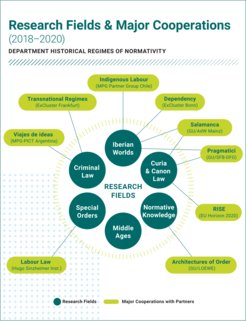
Results
What results have we achieved? While it is impossible to summarise the work of more than 40 researchers, which is sketched out in the individual reports following this introduction, some general developments and intellectual results should be highlighted.
First, we are extremely pleased that we have been able to expand our research to the non-American parts of the Iberian monarchies. To do so, we needed to incorporate new local expertise and find an adequate research design. The research project Glocalising normativities, established in 2018, has created such a framework for projects dealing with different situations involving the production of law in the Americas, Europe, Africa and Asia by focusing on certain regimes like ’dependency’, ’ownership’ and ’diversity’. By involving scholars from Angola, Brazil, Chile, China, Germany, Peru and Portugal, we are now able to draw on a wide variety of local archival sources. In this context, Mariana Dias Paes and her Research Group Law and the Creation of Dependency in the Iberian Atlantic are carrying out pioneering work not only in terms of research but also with regard to the form and level of cooperation with local partners. Other research projects also dedicated to the Iberian Indian domains are currently being prepared as postdoctoral projects (see Sirotti).
Yet the integration of a set of local studies from very diverse backgrounds is only possible if it is built upon solid methodological foundations. This leads us to a second major aim embarked upon in the last few years: to consolidate a method of writing a global legal history. Through a critical revision of the emerging field of global legal history, we have developed a method for writing a modern legal history in a global perspective that avoids Eurocentrism, is open to practices and materiality and understands legal history as the history of a vast diachronic process of production of normative knowlege (see Duve).
Pursued within the context of several projects, our third goal has been to substantially advance our knowledge of normativity stemming from religious authorities, especially moral theology and canon law in early modernity. The 800th anniversary of founding of the University of Salamanca in 2018 provided us with the opportunity to engage more forcefully in the debates in this field, with major contributions by José Luis Egío. Under the coordination of Pilar Mejía, a large group of authors has contributed to the Historical Dictionary of Canon Law in Hispanic America and the Philippines (DCH). With nearly 50 articles and more than 1500 written pages, this project has already made a demonstrable contribution to the research community not only in terms of expanding our knowledge about historical institutions of canon law but also by increasing the reliability of this information (see the reports of Mejía, Moutin, Soler Otte).
A fourth major aim in the last few years was to foster a dialogue between projects dedicated to different periods and areas within the Department. Examples of this intellectual integration include the research on the School of Salamanca, carried out in cooperation with the Goethe-Universität, and on the pragmatic literature, developed as a project within a DFG-funded Colloaborative Research Centre (Sonderforschungsbereich SFB), in which expertise on the European history of canon law (see Meyer) and book history, especially on one of the bestsellers of the early modern book trade, namely Azpilcueta’s handbook for confessors (Bragagnolo), provided valuable insights for the projects dedicated to colonial history (see Danwerth). In a similar way, it was possible to situate research on criminal law within a transatlantic perspective (Härter, Vegh Weis). Not least the Cross-Cutting Theme Law and Diversity has been pivotal in bringing together researchers, especially from Latin America and Europe, to discuss different experiences and theories in response to societal diversity (Collin, Bastias, Casagrande). In a certain sense, the whole research agenda of the Department – expressed in the Department’s new name Historical Regimes of Normativity as well as the underlying concept – has emerged from a fruitful confluence of research experience and theoretical reflection taking place between the projects concentrating on Germany and those with other regional focuses. Peter Collin, working together with Manuel Bastias, Gerd Bender and others, has actively engaged in this endeavour of bringing together German and non-German research traditions.

The encounter of the Spanish Manila Galleon with the Chamorro inhabitants of the Marianas Islands, Boxer Codex, ca. 1590
Thomas Duve
Director
Curia, Canon Law and Moral Theology in the Modern Era
Iberian Worlds
Knowledge of the Production of Normativity
How to write legal history in a global perspective? During the period under review, this question served as the backdrop for various ongoing and new research projects in the Department. This meant that the issue had to be dealt with in a very focused manner. In particular, the research on early modern moral theology, canon law and law in colonial contexts served as opportunities to do just this.
In the research project Knowledge of the pragmatici, planned in 2015 and carried out in cooperation with the Goethe-Universität Frankfurt until 2018, so-called ‘pragmatic literature’ was examined (see reports by Bragagnolo, Danwerth, Rex Galindo, Meyer) as a genre to which relatively little attention has been paid by the European tradition of legal history. Nevertheless, this genre is both of fundamental importance to the production of normative knowledge, not least in colonial encounters, and offers a productive medium for comparative studies between different legal cultures. In order to properly understand the function of this genre in the production of normative statements, a knowledge-historical approach was developed and tested in a series of case studies. Some of the results were published in 2020 in the first volume of a new series of open access publications [Duve, Danwerth, Knowledge of the Pragmatici, 2020]. Moreover, the findings of the more than 50 articles that were written during the reporting period by contributors from different countries for the Dictionary of Canon Law in Hispanic America and the Philippines (see Mejía, Moutin, Soler Otte) have improved our understanding of the processes of globalisation and localisation of religious normative knowledge in the early modern period.
The knowledge-historical approach has also proved fruitful with regard to the legal history of the School of Salamanca. Conceptual reflections and a close reading of the texts – of which many new digital editions have been created and made available by the long-term project financed by the Akademie der Wissenschaften und der Literatur Mainz (see Birr, Egío) and carried out in cooperation with Goethe-Universität Frankfurt – showed that the School can be understood as an epistemic community and a community of practice which is not limited to a specific place or institution [Duve, School of Salamanca. A Case of Global Knowledge Production, 2021]. As such, the project has contributed to a fundamental reconceptualisation of this significant intellectual movement.
Last but not least, an analysis of the state of the emerging field of Global Legal History [Duve, What is global legal history?, 2020] has motivated the development of these knowledge-historical perspectives on legal history. A number of other activities, such as the publication of a special issue of the American Journal of Comparative Law on the relationship between legal history and comparative law [Duve, Symposium: Legal History, 2018], a critical assessment of the German historiography [Duve, Ruppert, Rechtswissenschaft in der Berliner Republik, 2018] and contributions to two Oxford Handbooks [Duve, Global Legal History, 2018; Duve, Indigenous Rights, 2018] served to further develop these perspectives. Presentations in different countries and to different types of audiences, not to mention teaching activities in Beijing and Nanjing in 2019, helped bring exposure to the methodology developed mainly from research on Europe and Latin America and to facilitate discussions with colleagues from other analytical traditions. A volume gathering together several studies on methods of legal history published in Chinese (2019) as well as a Chinese translation of a book on legal scholarship in the Berlin Republic (2021) should serve to enhance the transnational dialogue about these issues.
The Joint Project Glocalising normativities, conceived in 2018 and started in 2019, is an attempt to put these methodological reflections into practice in a variety of local settings in a longue durée perspective. To carry out this ambitious project, a new generation of scholars from different areas were brought onboard (see the postdoctoral projects of Bastias, Coutinho, Dias Paes and Li as well as the PhD projects of Espindola Souza, González Escudero, Guerra Pedrosa, Matos Ñgala, von Bogdandy).
New Open Access publication series: Max Planck Studies in Global Legal History of the Iberian Worlds 
The first volumes of this new Open Access book series, begun in 2020 with Brill Publishers, publish the results of research carried out in the Department Historical Regimes of Normativity, especially in the Research Field Iberian Worlds. The focus of this series is global in the sense that it does not limit itself to the legal histories of the impe- rial spaces of Portugal and Spain as such, but also looks at the globalisation and localisation of norms within what we call the Iberian Worlds, ie the regions entangled with the imperial spaces of the Iberian monarchies during the early modern and modern periods. The global dimension is, moreover, underscored by the attention paid to the coexist- ence of a variety of normativities and their cultural translations at different times and in different places. 
All of the monographs, edited volumes and text editions in the series are peer-reviewed and available in print and online in Open Access. Brill’s Open Access books are distributed free of charge in Brill’s E-Book Collections and can be found via DOAB, OAPEN and JSTOR. |
Alfons Aragoneses
Affiliate Researcher
- Iberian Worlds
- Convivencia
Between 2018 and 2020 I participated in the project Convivencia and the Cross-Cutting Theme Law and Diversity. My approach to both was similar: I studied how legal discourses participated in the social reconstruction of the past in different historical periods.
All social groups, past and present, reconstruct the past to cause effects in the present, what anthropologist Christian Giordano called the ‘actualisation of the past’. Law has always played a role in this process of reinventing the past, for example, in the form of memory laws, reference to ‘legal tradition’, or preambles to laws or constitutions. The memory of law was the subject of a number of studies carried out during the reporting period [Aragoneses, La memoria del derecho, 2018].
My research on convivencia and filosefardismo [Aragoneses, Uses of Convivencia, 2018; Aragoneses, Judaism and Spanish identities, 2019] was aimed at understanding how the actualisation of the medieval past influenced the Spanish state- and nation-building processes. Spanish liberals used an idealised reinvention of Muslim, Christian and Jewish coexistence in the Middle Ages to defend their liberal / progressive political project for Spain. The message was that ‘Spain was tolerant in the Middle Ages, so Spain has to be tolerant today’.
My contribution to the activities related to the Cross-Cutting Theme Law and Diversity concentrated on legal unity and diversity in Spanish nation-building. Historically, Spanish cultural and linguistic diversity was not articulated via public law with a federal or regional structure. Diversity was recognised and accepted only in private law. When the process of codification started in the early 19th century, Catalan and other regional elites used the concept of tradition and references to history to pave an alternative way to legal modernity, resisting the unification of civil law and defending an actualisation of regional legal traditions. As a result, the Civil Code of 1889 did not unify Spanish private law, but instead respected the existence of different regional laws. History and tradition were used during this process to legitimise an alternative path to modernity. This explains the importance of regional civil law codes and traditions in today’s Spain [Aragoneses, El jurista en el barrio gótico, 2021].
Manuel Bastias Saavedra
Researcher
- Iberian Worlds
- Glocalising normativities (Joint Project)
- Frontier law: land, territory, and justice on the edges of the Pacific World (Chile and the Philippines, 1750–1860)
Global legal history is an emerging field that raises many epistemological, methodological and conceptual problems. It challenges a focus on Western and state-centred concepts of law; it reflects on different historical spaces and the interactions between different scales of research; it seeks to look at the foundations of the globalisation of law as the result of interactions between different world regions; and it rethinks the sources that are relevant for legal-historical research.
Many of these questions are addressed in the Joint Project Glocalising normativities, which attempts to understand how law operated in different world regions that participated in the so-called Iberian world. During 2019 and 2020, the workshops on ‘Methods and Sources’ served to discuss the concepts of glocalisation and normative production as well as the use of sources for research in global legal history. The three-part lecture series on ‘Norms and Empires’ invited leading historians in the field of imperial history to reflect on how they observed law within their own research experience. The research colloquium on ‘Global Legal History’ was created to give early-career researchers a space to discuss their research findings. During 2019–20, eight sessions of the colloquium discussed cases from Asia, Africa, Europe and the Americas.
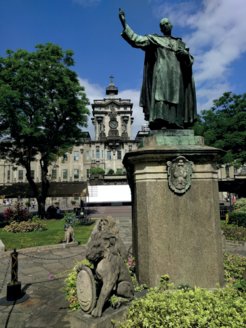
The research project Frontier law also takes a global legal-historical perspective to study how law operated beyond the realms of formal institutions traditionally associated with legal practice: books, universities and courtrooms. It focuses on notarial and judicial archives to study the regulation of land in two frontiers of the Spanish empire, Valdivia, in Chile, and Northern Luzon, in the Philippines. Initial findings of this project were published in 2018 [Bastias, Lived Space, 2018; Bastias, Jurisdictional Autonomy, 2018], and comparisons with land tenure regimes in other territories of the Spanish empire were addressed in a recently published critical historiographical essay [Bastias, Normativity of Possession, 2020]. An ERC Consolidator Grant, awarded in late 2020, will pursue these questions in different regions of the Iberian world (ERC IberLAND. Beyond Property: Law and Land in the Iberian World, 1510-1850). Together with Luisa Coutinho, I organised a panel at the Annual Meeting of the American Society for Legal History in 2019 in order to strengthen the Asian focus of the Institute. An edited volume on local normativities in Asia is currently under preparation.
To the Cross-Cutting Theme Law and Diversity, I contributed an article on diversity in Chilean constitutional history (in press), a methodological article [Bastias, Diversity as Paradox, 2020], and co-organised a conference on ‘Diversity and Public Law in Europe and Latin America’ in 2020.
Gerd Bender
Researcher
- Special Legal Orders
- Social regulation: modern corporatism and private power
The regulation of industrial relations and social security – including the corresponding justificatory narratives and constructs of legitimation, which focus on the use and abuse of private power – is one of the major issues that shaped the era of industrial society. From its beginnings in the 19th century, this historical field was marked not only by the emerging welfare state but also by the rise of associations that discovered subsystemic self-regulation as a new mode of labour policy.
There have been strong reactions to this development on the European continent. The self-regu-lating world of the new corporate actors comes into the perspective of the state. Self-regulation is transformed by state norms; the unfolding collective labour law, coupled with the novel regulator of collective bargaining autonomy, becomes a prototypical legal innovation. Regulated selfregulation refers to the template configuring the new notion of statehood, the expanded state or the political system with its increasingly rich periphery of associations linked to the state as the system centre. From the mid-19th century to the present day, strategies of fortification and consolidation have appeared in this context of interwoven regulation. Associations should assume the public role they have grown accustomed to and incorporate the reference to the state into their self-description. In return, they can expect state recognition and consideration (neo-corporatist trade-off).
The project attempts to capture this tripartite regime, its practices and its resonance within the legal system in a historical longitudinal view. Starting from the profound controversy about unemployment and economic stagnation that has affected the entire EU, especially Germany, since the 1980s [Bender, Herausforderung Tarifautonomie, 2018], the project focused on the labour constitution of Weimar, which developed the fragmented historical-institutional heritage of the German empire into an overarching normative order (publication forthcoming). The legal-theoretical turbulence that took place over the course of the innovations was dealt with using the debate on collec-tive agreement as an illustration of an institution of the legal system.
The project is integrated into the Research Field Special Legal Orders. There are close ties to the research project Non-state law of the economy, and the ongoing cooperation with the project initiative History of labour law continues to offer a productive research context.
Christiane Birr
Affiliate Researcher
- Curia, Canon Law and Moral Theology in the Modern Era
- Iberian Worlds
- Salamanca in America
- The School of Salamanca. A Digital Collection of Sources and a Dictionary of Its Juridical-Political Language
The School of Salamanca has traditionally been identified as a comparatively small and close-knit group of Spanish theologians – beginning with Francisco de Vitoria and arguably ending with Francisco Suárez – who shaped the intellectual transition from medieval thought to modernity, not only in Catholic theology but also regarding many key legal concepts. The university of Salamanca was seen as the centre from where new and exciting thoughts were being projected into the (New) world. This traditional picture has proven in need of various fundamental adjustments which are at the heart of the work being undertaken.
Two book chapters look at early writings about the discovery and conquista of the Americas and focuses on jurists and theologians, such as the Castilian court jurist Juan López de Palacios Rubios [Birr, Before Vitoria. Early Theological and Juridical Responses to the Spanish Expansion, 2018; Egío, Birr, Before Vitoria: Expansion into Heathen, Empty or Disputed Lands, 2020]. Palacios Rubios marshalled an arsenal of arguments from Antiquity, Scripture and the Church Fathers to come to terms with the new reality of the Americas, providing a pool of erudite arguments that later authors like Francisco de Vitoria would extensively draw upon. For example, he postulated the status of the Amerindians as free subjects of the Castilian crown (as opposed to the Aristo-telian idea of ‘slaves by nature’) as well as the need to respect indigenous forms of property [Birr, Dominium in the Indies, 2018].
Another focus is the concept of the School itself, particularly the question of how we can define it to represent a global network whose members formulated answers to autochthonous questions in all parts of the Iberian empires, from the Americas to the Philippines, Japan and Goa, as well as in Europe. This perspective was discussed at an international conference in Buenos Aires in October 2018 and has been deepened in a volume in the series Max Planck Studies in Global Legal History of the Iberian Worlds [Duve, Egío, Birr, School of Salamanca, 2021].
Finally, the Digital Collection of Sources (part of the project The School of Salamanca, a cooperation between the Goethe-Universität Frankfurt, the Akademie der Wissenschaften und der Literatur Mainz, and the Institute) approaches texts printed in the 16th and 17th centuries with the methods and tools of the Digital Humanities. This work is carried out in close cooperation with colleagues from the technical disciplines: an in-depth understanding of each other’s research needs and methods is essential for a meaningful use of algorithmic tools for textual analysis, which will hopefully enable us to identify the School of Salamanca’s ‘digital fingerprint’.
Luca von Bogdandy
Doctoral Student
Iberian Worlds
- Glocalising normativities (Joint Project)
- Reforms of judicial systems in 18th-century Italy. Concepts, methods, successes and failures of Bourbon, Habsburg and papal attempts to establish centralised judicial authority
According to our modern understanding, courts – and the judiciary more generally – are among the core competencies of the state. However, this understanding is the result of a long historical development. In the early modern period, many courts were feudal, municipal, or run by guilds or religious institutions, and thus derived their authority from a variety of sources that were often unconnected to the sovereign.
The doctoral project Reforms of judicial systems in 18th-century Italy examines how during the process of modern state-building the sovereigns of the main Italian states attempted to incorporate courts more firmly into their sphere of rule. A key question is how these different states tried to integrate the various tribunals into the developing organisation of the modern state, that is, to bring them under their authority according to the modern idea of sovereignty.
The starting point is the analysis of concrete reform projects in the formerly (until the Peace of Utrecht 1713) Spanish-dominated territories: the Kingdom of Naples-Sicily, the Duchy of Milan and the Papal States. Particular attention is paid to the reasons why certain reform projects were not, or only partially, successful, and thus other authorities persisted. This continued legal plurality within the individual territories could take two forms: either old institutions resisted the reform attempts, or they continued within the new institutions. This focus is part of a more general research question on the typical forms of judicial independence and accountability.
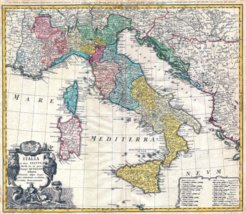
In contrast to previous research in this field, this study takes a more institutional approach and will in particular address the question of whether new courts were set up, how the courts and judges were organised and financed, and how dissenting judges were sanctioned. For the selection and presentation of the material, the theory of historical institutionalism is decisive.
Manuela Bragagnolo
Researcher
- Curia, Canon Law and Moral Theology in the Modern Era
- Iberian Worlds
- Knowledge of the Production of Normativity
- Legal knowledge and the emergence of print. Textuality and materiality in early modern legal books
- HyperAzpilcueta. Visualising the instability of early modern normative knowledge
With the emergence of print, books started to become the media that more than any other stored and mobilised normative knowledge. The question how the changes in the production, circulation and consumption of legal books affected the normative knowledge production in the Iberian worlds has been at the centre of two related research projects carried out in the last years on the most successful pragmatic normative book of the early modern period: the Manual de Confessores by Martín de Azpilcueta (1492–1586).
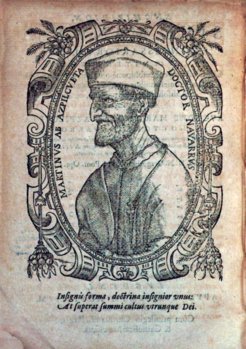
Portrait of Martín de Azpilcueta (1492–1586)
Both projects emerged out of a preceding one entitled Martín de Azpilcueta’s Manual for Confessors and the Phenomenon of Epitomisation (2016–2018) and follow complementary methodological approaches. Legal knowledge and the emergence of print combines legal historical research with methods and analytical categories from book history. In addition to the editions of the Manual, it explores archival documents such as lawsuits and notarial deeds.
The project HyperAzpilcueta focuses on the instability of early modern books, using Digital Humanities methods to create a comparative digital edition of the four main editions of the Manual. The project aims to visualise the authorial changes in the text in order to explore how normative knowledge changed within the ‘same’ book.
Two studies published during the reporting period [Bragagnolo, Managing Legal Knowledge, 2020; Bragagnolo, Les voyages du droit, 2018] shed new light on the textual dynamics of Azpilcueta’s work by showing the relevance of authorial changes to early modern normative knowledge production. The studies reveal a complex process of epitomisation in which the addition of legal doctrines, the text’s translation into different languages and the updating of the Manual with answers to questions coming from all over the world played a fundamental role.
While both the history of knowledge and book history have thus far paid little attention to law, nowadays, due not least to Antonio Manuel Hespanha’s seminal studies, approaches which were developed in the field of book history over the past decades are slowly being applied to legal historical scholarship. My research tries to further develop these approaches by using the material and digital ‘total history’ of an extremely successful book in order to show how normative knowledge was produced in the early modern period.
In addition to these research projects, I am cooperating in the project Digital Library De Indiarum Iure and am one of the Institute’s two responsible researchers in the EU-funded four-year project RESISTANCE.
Wolfram Brandes
Affiliate Researcher
- Religious and secular legal cultures of the European Middle Ages
The research undertaken in the years 2018–2020 focused on the study of the historical circumstances surrounding the synod known as Quinisextum or Trullanum, held in Constantinople in the spring of 692. It issued 102 canons, which to this day constitute the core of the canon law of the Orthodox Churches. The emperor Justinian II – one of the most fascinating figures in first-millennium Byzantine history – initiated substantial reforms of both state and Church. The synod’s 102 canons, some of which are very extensive, have been much discussed in international scholar- ship in recent years, but several aspects of their contemporary context have been overlooked. The most important of these is the imperial propaganda of Justinian II, directed against the Arab caliphate. The acts of the Quinisextum / Trullanum (composed of its canons and a long text from the council fathers to the emperor (logos prosphonetikos) include a number of Bible quotations, particularly allusions to the Old Testament, which contain hidden references to the emperor’s political agenda, of which the Quinisextum / Trullanum was part. Only by taking this into account can the content and intention of the canons be understood – and thus also the peculiarities of the canon law of the Eastern Churches, which are still relevant today.
The findings will be published in a monograph that will focus on the emperor himself, in addition to the canons mentioned above. However, the monograph will not be a biography of this fascinating emperor (though his life was worthy of a Hollywood movie of the 1950s or 1960s), since in my opinion the lack of sources prevents us from writing biographies for pre-modern figures.
At the same time, I am preparing a volume dealing with the history of Byzantine administration from the sixth to the ninth / tenth centuries for the methodica-series of the Institute. Considerable overlap between this volume and the study on the Quinisextum / Trullanum and Emperor Justinian II are of great benefit to both projects.
Pamela Cacciavillani
Former Researcher
- Iberian Worlds
- The protection of private property in the face of the indigenous people’s reality in Argentina, between the end of 19th and the beginning of the 20th century
During the period covered in this report, the main activities were dedicated to finishing my PhD thesis and preparing it for publication, as well as to developing a postdoctoral project.
The main aims of the PhD thesis From communal property to liberal property. The legal system of property in Cordoba (1871–1885) were to understand the legal-historical aspects that enabled the continued existence of indigenous communal property in times of codification, and to investigate what role the Civil Code played within the process eventually leading to the demise of indigenous communal property in Cordoba. The thesis was presented at Universidad Nacional de Córdoba, Argentina, in 2018 and obtained the highest qualification and recommendation to publish.
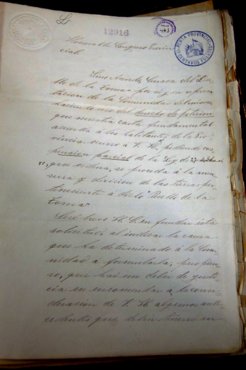
Petition presented by the curaca of the pueblo La Toma before the Honourable Provincial Congress of Córdoba in 1882
The postdoctoral project The protection of private property in the face of the indigenous people’s reality in Argentina seeks to contribute to a more comprehensive understanding of the phenomenon of land conflict concerning indigenous communities. The focus is on an approach that puts the effects of the various mechanisms for the protection of property / possession into dialogue among themselves. A key concept within the project is the property registry and its function of protection and legal security.
The project is now being continued from my new affiliation as Full Professor for Legal History at the Universidad de Monterrey, UDEM-Mexico, and as a Candidate to National Research (SNI) of CONACYT (2020–2022).
Agustín Casagrande
Affiliate Researcher
- Iberian Worlds
- The crisis of liberalism and the formation of exceptional regulations (Sonderordnungen) in Argentina in the 20th century
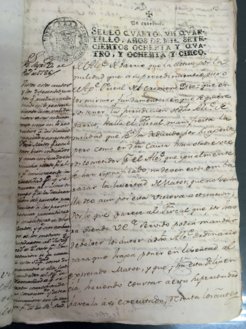
Dossier formed on the jurisdiction of the Alcaldes de la Hermandad (minor local authorities), part of the criminal case against Juan Godoy, late colonial Buenos Aires
One focus of research during the reporting period was the participation in the Cross-Cutting Theme Law and Diversity in cooperation with Peter Collin and Manuel Bastias Saavedra. The objective of the Cross-Cutting Theme is to bring together contributions from Latin America and Europe that tackle the question of how the modern law of the 19th and 20th centuries, based on the principle of equality, dealt with social inequality and social diversity. Two conferences held in June 2019 addressed this question from the perspective of national developments in Latin America and Europe and examined fundamental questions of legal doctrine. Two further conferences, held online in November and December 2020, respectively, dealt with the diversity dimension in public law. These events brought together specialists from both sides of the Atlantic not only to under- stand the way in which the logic of equality–diversity was instituted in diverse social contexts, but also with the intention of displacing the hegemony of European perspectives. This involved the analysis of processes of the transfer and hybridisation of knowledge that allowed alternative responses to questions regarding the resolution of conflicts to be formulated in different legal spaces. My contributions focused, first, on the ‘sociological imagination’ in Argentine legal sociology in the 19th and 20th centuries, and, second, on the concept of autonomy as a tool of subjectivation and identity formation in 20th-century Argentina. A volume gathering together the key contributions from the first two conferences is being edited by Peter Collin and me.
The second focus of research, the project The crisis of liberalism and the formation of exceptional regulations (Sonderordnungen) in Argentina in the 20th century, is also connected to the diversity theme. The project’s first result was a study on how the concept of the rule of law in Argentina allowed for differentiated administrative regulation [Casagrande, The concept of Estado de derecho, 2018]. The second result was a monograph on the formation of the police institution – and its special regulations – aimed at the social control of particular sectors in Rio de la Plata in the 19th century [Casagrande, Gobierno de Justicia, 2019].
In addition to this, I contributed conference papers and articles to various other MPI projects, such as the Historical Dictionary of Canon Law (DCH) [Casagrande, Confesos, 2019] and Knowledge of the pragmatici [Casagrande, Forensic Practices, 2020].
Pietro Cesari
Doctoral Student
- Knowledge of the Production of Normativity
- The corporation and the conception of modern space
The project The corporation and the conception of modern space is part of the LOEWE focus Architectures of Order, which aims to analyse architecture as a cultural ordering practice that operates at the interfaces of control, knowledge, design and subjectivation. The LOEWE sub-project Corporate architecture investigates the architectural implications of both legal and managerial structures to better understand the corporate institutional revolution (see also the report of Damler).
The rise of the corporation as the predominant economic player in the early 20th century radically disrupted traditional economic theories. The stock exchange’s new mechanism of raising and collecting capital opened up completely new legal and economic perspectives. The par- celledout ownership in shares led to the disintegration of the traditional unique right of property in its two distinct components of ownership and control. The rise of the modern corporation was made possible through the power of disposition (control) handled by the rising figure of the sala- ried manager. This new role contributed to the development of innovative systems of control and administrative coordination, which proved to be more efficient than the traditional market mechanisms of price equilibrium.
The connection between architecture and corporate organisational models remains substantially unexplored. Through an historical analysis, the project aims to investigate the ways in which the new structure of the corporation and its mechanisms have affected the built environment and how, conversely, architectural design has influenced corporate structural organisation. This is pursued through the analysis of selected case studies from Germany, Italy and the USA. At the centre of the study are the corporate architectures of control and coordination: headquarters as well as subsidiaries’ buildings. My comparative approach connects the selected case studies’ corporate strategies and organisational structures with their real estate ventures. Both realised and unrealised building projects are examined to clarify the relation between organisation culture and design culture, and the role of architectural practices within it.
Peter Collin
Researcher
- Special Legal Orders
- Regulated self-regulation in a legal historical perspective
- History of conflict resolution in Europe
- Schiedsstaatlichkeit. Balancing of state and private interests by arbitral institutions in the German Empire and the Weimar Republic
- Non-state law of the economy
Two projects were completed during the reporting period.
The project Regulated self-regulation in a legal historical perspective, which investigated private state regulatory patterns of the 19th and early 20th centuries, was concluded with a comprehensive, digitally available source edition [Collin, Regulierte Selbstregulierung, 2018], which illustrates the legal framework for various sectors of regulated self-regulation; each chapter begins with a comprehensive introductory essay.
The project History of conflict resolution in Europe, part of a larger project network in cooperation with researchers from the Goethe-Universität Frankfurt, has also been completed. The intention was not to produce a conventional history of justice but a presentation that also took into account extrajudicial and non-state forms of institutionalised conflict resolution. The result is a handbook in four volumes; I am editor of the fourth volume (19th / 20th century) with about 50 contributions, including research reports on almost all European states. The volume’s text has been finalised, but it is to be printed only when the other parts of the handbook are available too.
The starting point of the currently ongoing project on Schiedsstaatlichkeit in the German Empire and the Weimar Republic was the finding that, in addition to the ‘normal’ structures of state jurisdiction, there existed another judicial world of a more semi-state nature. Though these arbitral institutions dealt with relatively small numbers of cases compared to the state judicial system, and did not achieve a lasting status, they did not exist in insignificant niches but rather at key points of legal policy: in the economic sphere, the world of labour, in the field of social policy, and above all in times of war and crisis. The project aims to grasp the structures, normative frameworks and to some extent also the judicial practice of these institutions, and to identify common procedural and decision-making patterns. Publications have appeared on courts of honour [Collin, Nichstaatliche Disziplinierung, 2018] and on the arbitration tribunals of the war economy [Collin, Justiz mit abgesenkten Standards?, 2019]. A monograph is planned that will provide a comprehensive overview.
Details on another current project on Non-state law of the economy can be found in the report by project collaborator Johanna Wolf.
Both of the latter projects are part of the Research Field Special Legal Orders, which aims to examine how in the legal systems of the 19th and 20th centuries, which claimed universality, new particular legal spaces emerged. They are also part of the Cross-Cutting Theme Law and Diversity, described in the report of Agustin Casagrande. In addition to this, I currently supervise two PhD projects (see the reports of Fuchs and Wolckenhaar).
Luisa Stella de Oliveira Coutinho Silva
Researcher
- Iberian Worlds
- Glocalising normativities (Joint Project)
- Christian Japanese in the Portuguese Empire: circulation and production of normativities in Japanese lay communities (1540s–1630s)
My postdoctoral research project on the circulation and production of normativities in Japanese lay communities builds on a methodological approach I developed in my previous work on the legal history of colonial women. Studying the women of Paraíba, a captaincy of northeast Brazil, I used the concept of multiple normativities to analyse dozens of daily life cases from Portu- guese and Brazilian archives. The results of this research showed that the law of the metropole was not simply transplanted to the colony but rather interacted with local normativities, providing options to women depending on the intersection of their status, condition, religion and sexuality that demonstrated the flexibility of sex and gender categories according to the practice of law [Coutinho Silva, As dotadas e meeiras, 2020; Coutinho Silva, O saber médico e o corpo, 2019; Coutinho Silva, Land, Slaves, and Honour, 2020; Coutinho Silva, Nem teúdas, nem manteúdas, 2020].
For the current project, I expanded the scope of my study on women‘s legal history in the Portu- guese Empire to include Asian territories. Using missionary activity in Japan from the 1540s to the 1630s as my case study, I particularly focus on lay brotherhoods as loci of the production of normativities. In the absence of Catholic priests, these confrarias of converted Japanese were organised by Japanese lay practitioners, both women and men. In order to contextualise the missionaries’ sources about the lives of the converted and the mission in Japan (such as letters, reports, questions on daily life issues, pragmatic literature, and histories of Japan) that circulated throughout the Iberian empires, my approach takes into consideration also Japanese legal history and sources in Japanese. The aim is to write a legal history based on religious practices as normative cases considering both traditions, in particular to demonstrate how practices surrounding marriage, inheritance and kinship systems, repudiation, divorce, and the role of women in the confrarias redefined social roles and legal categories as they were culturally translated and adapted. Therefore, methodologically my work is still located at the intersection of legal history, women’s history, gender studies and global history.

Rakuchū-rakugai zu (scenes in and around the capital), Edo period (1615–1868)
During the first of several planned visits to archives and research stays, I was a Visiting Research Fellow at Waseda University, Tokyo, in June 2019, where I had the opportunity to develop networks of collaboration with Japanese scholars and to deepen my familiarity with Asian legal historiographies, the Japanese language and sources.
Daniel Damler
Affiliate Researcher
- Knowledge of the Production of Normativity
- Corpotopia. Architectures of fictional enterprises
Since 1 January 2020, the Institute has been involved in the LOEWE research project Architectures of Order, a four-year cooperation with the Technische Universität Darmstadt’s Department of Architecture, the Art History Institute of the Goethe-Universität Frankfurt, and the Deutsche Architekturmuseum, funded by the German federal state of Hessen. Like Pietro Cesari’s PhD project (see his report), my research on Corpotopia. Architectures of fictional enterprises is part of the sub-project Corporate Architecture. Corpotopia examines the political, legal, economic and architectural content of representations of corporations in popular utopias and dystopias since the 1920s. It builds on preliminary work, such as Konzern und Moderne. Die verbundene juristische Person in der visuellen Kultur 1880–1980 (‘Corporate Modernism. Corporate Groups in Visual Culture 1880–1980’), published in 2016, which examined ‘corporate images’ as part of the psychological profile of high modernity.
At the same time as large multinational corporations began to compete with the state as the hitherto dominant political and economic actor in reality, the entertainment industry started to create fictional parallel worlds dominated by large corporations. Examples are the comics Superman (DC Comics, since 1938) and Batman (DC Comics, since 1939) with LexCorp in Metropolis and Wayne Enterprises, Inc. in Gotham City, respectively. Architectures play a prominent role in the dramaturgical concepts of comics and films, both literally and metaphorically: such corporations (often holding companies) have an astonishingly complex legal architecture, and this complexity and power requires a convincing visualisation, for which buildings (corporate headquarters) are best suited. A small database of almost eighty fictional large companies in films and comic strips is currently under construction.

The CEO as world ruler – a German predecessor from 1920
The popular visions of corporate poststate structures are in some respects in the tradition of early modern Staatsromane (beginning with Thomas More’s Utopia of 1516), in that they condense political and social developments whose consequences are not yet foreseeable into vivid speculations and thus, thanks to their widespread circulation, influence these developments.
Otto Danwerth
Former Researcher
- Curia, Canon Law and Moral Theology in the Modern Era
- Knowledge of the Production of Normativity
- Knowledge of the pragmatici
- Erasmus, Christian humanism and spirituality
The research carried out centred on the legal and cultural history of religious normativities in Ibero-America. The principal aim of the project Knowledge of the pragmatici was to show that the circulation of pragmatic normative texts – particularly religious ones – contributed to the establishment of knowledge regimes in Spanish America (16th–17th centuries). Handbooks of moral theology, catechisms and confession manuals were central media for the diffusion of normative orders in an emerging empire. Based on a review of the multidisciplinary historiography on the circulation of books and on archival sources, the project compared the respective roles of the transatlantic trade and the American printing presses. Case studies of book inventories in colonial Mexico and Peru showed that pragmatic books and manuscripts provided resources of normativity not only in towns but also to rural users and readers in areas of missionary activity. The research resulted in a number of publications [Danwerth, Duve, Knowledge of the Pragmatici, 2019; Danwerth, The Circulation of Pragmatic Normative Literature, 2020]. Two extensive research bibliographies, one on colonial Ibero-America in general and one on the circulation of pragmatic normative literature in Ibero-America, were prepared during the reporting period, the first of which was published in February 2021 [Danwerth, A basic bibliography, 2021].
These endeavours are connected to the three co-edited volumes on ecclesiastical institutions and normativities in the viceroyalties of, respectively, New Spain, Peru and New Granada, published in the GPLH series [Albani, Danwerth, Duve, Normatividades e instituciones, 2018; Danwerth, Albani, Duve, Normatividades e instituciones, 2019; Mejía, Danwerth, Albani, Normatividades e instituciones, 2020]. Taken together, they demonstrate the peculiarities of these key Spanish American regions whilst at the same time enabling meaningful comparisons. The co-written introductory chapters focus on the forms of production and adaptation of different types of normative knowledge in specific local contexts and reveal their links with global debates for both the colonial and post-independence periods.
A related research project was a study on Erasmus, Christian humanism and spirituality in Spain and New Spain (Mexico) [Danwerth, Erasmus, 2020]. The writings of Erasmus of Rotterdam exerted a significant influence on 16th-century Spain. The essay re-examines classical and recent historiography and deals with Erasmianism in Spain from its widespread reception in the 1520s to the inquisitorial persecution of its followers from the 1530s onwards. A discussion of newer research trends stresses their implications for legal history, also with regard to the relationship between humanism and scholasticism. To demonstrate Erasmus’ influence in New Spain, the investigation turns its attention to the attitudes of clerics as well as to early colonial case studies.
Max Deardorff
Former Researcher
- Iberian Worlds
- New Christians, old Christians and others – cultural Mestizaje and the Christian Republic of Philip II
Convivencia: Iberian to Global Dynamics, 500–1750 was an interdisciplinary research project carried out by several Max Planck Institutes that ended in December 2018. As part of it, the comparative project New Christians, old Christians and others focused on the integration of moriscos (former Muslims of southern Spain) and indios (conquered subject peoples of the Americas) into the Catholic monarchy of the Spanish king Philip II (1556–1598). It highlighted how Catholic reform at the Council of Trent (1545–1563) reshaped the demands of municipal citizenship in the frontier territories of the Spanish empire. Research was conducted on three kinds of sources: notarial and municipal records of Bogotá (Colombia), Tunja (Colombia), and Granada (Spain); royal memoranda from archives in Seville (Spain) and Simancas (Spain); and synodal and conciliar statutes from across the Spanish Empire during the same period. A key question was how the legal rhetoric in petitions for and assertions of citizenship by imperial subjects (moriscos, indios) evolved in concert with successive conciliar and synodal legislation. The project found that whereas performative elements of orthodox Catholicism were not important in such assertions prior to c. 1560, they became crucial in subsequent decades, when those imperial subjects who did not adopt elements of performative Catholicism were increasingly relegated to second-class status and, in the case of the moriscos, completely disenfranchised and forced into exile.
A monograph with the project’s results is currently being prepared. A number of articles and one book chapter exploring different facets of the overall research project have already been published. Topics include the development of the social label morisco in the process of relegating mudéjars to second-class citizenship [Deardorff, Quién es morisco, 2018], the integration of local subject communities into the monarchy as republics [Deardorff, Republics, 2018], the performed Catholicism of early native converts in Colombia [Deardorff, Local Factors: Indigenous Devotion, 2018], and an investigation of how devotion to a Colombian miracle underwrote the integration of natives into the Christian body politic [Deardorff, Politics of Devotion, 2018].
Wim Decock
Affiliate Researcher
- Curia, Canon Law and Moral Theology in the Modern Era
- The canon law of business
During the three years as an affiliate researcher, the project The canon law of business generated several publications on major authors and their works that are directly relevant for studying the renewal of canon law thinking on economic and legal topics in the early modern period, such as Martín de Azpilcueta, Martin Becanus, Juan de Mariana, Charles Dumoulin and Tommaso de Vio Cajetanus. Because of the close collaboration with the Department of Roman Law and Legal History in the Faculty of Law at the Katholieke Universiteit Leuven (KU Leuven), where I hold my main appointment, several doctoral research projects at the crossroads of canon law, theology and economics have been carried out, eg Wouter Druwé’s project on Transregional Normativity in Learned Legal Practice. Loans and Credit in Consilia and Decisiones in the Northern and Southern Low Countries (c. 1500–1680), Paolo Astorri’s prize-winning Lutheran Theology and Contract Law in Early Modern Germany (c. 1520–1720) and Joost Possemiers’s ongoing research on Loans and Credit in Conrad Summenhart’s Opus Septipertitum de contractibus (c. 1500). All three junior researchers have been involved in research stays or conferences organised at the Institute.
Through collaboration with Drew McGinnis at the Acton Institute, the project has also been involved in managing the Sources in Early Economics, Ethics and Law publication series since 2018. The series provides translations of Latin sources relevant for the study of the relationship between Christianity (Lutheran / Calvinist / Catholic) and early modern business law. A final publication that illustrates the fruitfulness of the project’s ambition to study the interconnections between theology, law and economics is the monograph on the economic thought of Leonardus Lessius (1554–1623), a Jesuit from the Low Countries [Decock, Le marché du mérite, 2019]. It gives a detailed account of Lessius‘s analysis of the dynamics of the market, information and speculation, trade and insurance, competition and monopoly, public and private lending, money and interest, etc. It shows that canon lawyers and theologians in the early modern period steeped in the tradition of the School of Salamanca contributed substantially to the moral legitimation and legal articulation of the rise of modern business and finance.
Cluster of Excellence Beyond Slavery and Freedom (Universität Bonn) Since January 2019, the Department Historical Regimes of Normativity has been participating with a Research Group in the new Cluster of Excellence Beyond Slavery and Freedom. Asymmetrical Dependencies in Pre-Modern Societies at the Universität Bonn. The aim of the Cluster is to overcome the established analytical dichotomy of ‘slavery / freedom’ by promoting ‘asymmetrical dependency’ as a more precise concept for historical analyses of inequalities concerning the distribution of power and resources in different societies. 
The members of the Research Group: Maysa Espíndola Souza, Mariana Dias Paes and Juelma Matos Ñgala
|
Mariana Dias Paes
Researcher / Former Doctoral Student
- Iberian Worlds
- Glocalising normativities (Joint Project)
- Slaves and land between possession and titles: the social construction of property law in Brazil (1835–1889)
- An ocean of norms: dependency and property in the Lusophone South Atlantic (1780s–1880s)
- Global legal history on the ground: court cases in African archives
Court cases are essential to the writing of legal history and global legal history as they show the active participation of subaltern groups in the process of normative production. They are thus at the centre of the research projects described below.
In 2018, the PhD project Slaves and land between possession and titles: the social construction of property law in Brazil (1835–1889) was concluded and defended. It was awarded the Max Planck Society’s Otto-Hahn-Medal in June 2020 and the resulting monograph will be published in 2021. The dissertation focused on the social construction of legal relations between people and things in 19th-century Brazil by analysing 74 legal proceedings of the Court of Appeals of Rio de Janeiro that discussed dominion and possession over slaves and land. This analysis demonstrated that labour relations and access to land were entangled, both in terms of their legal regulation and in the historical agents’ perceptions and demands for rights. Based on these findings, the postdoctoral research project An ocean of norms: dependency and property in the Lusophone South Atlantic (1780s–1880s) analyses these two dimensions of ‘dependency relations’, again on the basis of court cases.
Parallel to these individual projects, I lead the Research Group Law and the Creation of Dependency in the Ibero-Atlantic, a cooperation between the Institute and the Cluster of Excellence Beyond Slavery and Freedom. Asymmetrical Dependencies in Pre-Modern Societies at the Universität Bonn, advising two PhD projects (see the reports of Juelma de Matos Ñgala and Maysa Espíndola Souza). I also cooperate with Mariana Candido (Emory University) and Juelma de Matos Ñgala
to create an inventory of the court cases in the archive of the Benguela District Court in Angola. A book containing an introduction to Angolan legal history and the inventory of the court cases is in its final stages of preparation and will be ready for publication in 2021.

Court cases at the Benguela District Court
All these projects draw attention to the existence of a shared legal space of normative production in the South Atlantic. Moreover, research in the African archives showed that the court cases they preserve hold great potential for writing a global legal history from a non-Eurocentric perspective that considers subaltern groups as active participants in normative production. The project Global legal history on the ground therefore seeks to foster research on court cases stored in Lusophone African archives. Currently, the project cooperates with archives in Cape Verde and Guinea Bissau to organise the collections, compile and publish inventories, and digitise documents.
José Luis Egío García
Affiliate Researcher
- Curia, Canon Law and Moral Theology in the Modern Era
- Iberian Worlds
- Salamanca in America
- The School of Salamanca. A Digital Collection of Sources and a Dictionary of Its Juridical-Political Language
In the reporting period, a number of contributions analysing the complex translation process of the Salmantine scholastic methods to the early modern Mexican context were made to the project Salamanca in America. The research showed how unforeseen dilemmas regarding war, conversion, forced labour or dubious commercial practices were resolved by jurists and theologians trained at Salamanca, who undertook a critical revision of the normative knowledge produced by their former masters. Among the more significant outcomes of this line of research are a contribution investigating these processes in the reception of the Speculum coniugiorum by Alonso de la Vera Cruz (first presented at the conference ‘The School of Salamanca. A Case of Global Knowledge Production’ held in Buenos Aires in October 2018 and now included in a volume of the mpilhlt book series Global Legal History of the Iberian Worlds, edited by Duve, Egío and Birr) [Egío, Producing Normative Knowledge between Salamanca and Michoacán, 2020] and a study on Tomás de Mercado’s role in the emergence of probabilism [Egío, Tomás de Mercado, 2020]. In these publications, some of the sources edited within the Digital Collection of Sources of the project The School of Salamanca are used to exemplify the methods of normative knowledge production put into practice by scholars educated in Salamanca working on both sides of the Atlantic.
This renewed perspective on the global impact of the School of Salamanca as a community of discourse engaged in the production of pragmatic knowledge aims not only to re-examine its geographical coordinates but also to re-evaluate its chronological framework and the role played by Francisco de Vitoria. Juridical and theological treatises authored by different Salmantine doctors since the mid-15th century show that Vitoria’s thinking on ius gentium was situated within a long tradition of debates on the expansion into heathen or disputed lands [Egío, Matías de Paz, 2018; Egío, Birr, Alonso de Cartagena y Juan López de Palacios Rubios, 2018; Egío, Birr, Before Vitoria, 2020].
A conceptual and multidisciplinary bibliography on the School of Salamanca (2008–19) [Ramírez Santos, Egío, Research on the School of Salamanca, 2020] and a critical reassessment of previous historiography are also among the important milestones achieved in the last three years [Ramírez Santos, Egío, Conceptores, autores, instituciones, 2020].
Caspar Ehlers
Researcher
- Religious and Secular Legal Cultures of the European Middle Ages
- Law and mission
One of the Institute’s four Research Foci between 2010 and 2020 was dedicated to Legal Spaces. Its main aim was to sensitise scholars working on different periods and regions to the importance of spatial concepts: to how law creates space and is, in turn, shaped by it. One of the key research outcomes during the reporting period was a 150-page bibliography [Ehlers, Forschungsbibliographie Rechtsräume, 2019], available online and in Open Access as a mpilhlt Research Paper. This bibliography substantially extends and updates that of the monograph Rechtsräume, which was published in the Institute’s methodica series in 2016. A second key research outcome is an edited volume published in 2020 [Ehlers, Grewe, Rechtsräume, 2020] which combines historical and archaeological perspectives on the history of legal spaces and demonstrates the need to integrate knowledge from these still often separate fields. Notwithstanding the importance of archaeolog- ical finds, written sources – known as ‘traditions’ in methodological jargon – are of course the conditio sine qua non for most legal-historical research. However, only the inclusion of evidence from archaeology, architectural and art history, and of the results of the scientific sampling of bio- logical finds opens up the dimension of ‘material remains’, the second, equally relevant group of historical sources according to Mommsen’s definition.
The new project on Law and mission, the development of which began in autumn 2019, puts these insights into practice and combines them with earlier research on the construction of medieval legal spaces. A number of preparatory publications have dealt with this subject [Ehlers, Straßensysteme der Vorgeschichte 2018; Ehlers, Orte und Reisewege, 2020].
The participation in major exhibitions has brought the challenge of presenting research findings in a different format, for example in the context of the 2019 exhibition Der charismatische Ort in the museum of the Kaiserpfalz (imperial palace) at Ingelheim. Many of these and other methodological challenges were discussed in quarterly PhD colloquia and other working groups in which I participated as departmental PhD mentor.
In 2020, two further volumes were published under my editorship as a result of the project Die deutschen Königspfalzen, one on the city of Regensburg; the second, on Baden-Württemberg, completed the survey for that region.
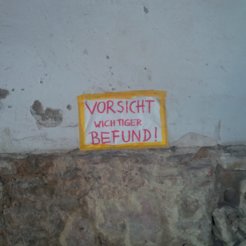
Sometimes it takes an experienced eye to see what is important
Karla L. Escobar Hernández
Researcher / Former Doctoral Student
- Iberian Worlds
- Indígena legal culture. Multiple voices of citizenship, indigeneity, and justice in Cauca (Colombia), 1880–1967
The PhD project Indígena legal culture investigated the changes in indígena legal practices in Cauca, Colombia from the end of 19th to the mid-20th century in order to gain a better understanding of the entangled relations between the creation of law, its interpretation and usage, and social change.
The research focused on the communicative experiences of both the governmental authorities who were in charge of creating and applying the indígena law in Colombia and the people classified as indígena or who wanted to be classified as such. By using some of the tools of microhistory and ethnohistory, the project explored how the categories of citizenship, indigeneity and justice were constructed in the communication processes between these disparate actors. The study made three main contributions to scholarship. First, it described and analysed the interdependence of the processes of the creation and enforcement of laws as well as the roles that specific actors played in those processes from the legal historical perspective. It thus revealed the many (legal and extra-legal) conflicts and negotiations that lay behind the definition of basic legal categories. The interplay of the different uses of the term indígena in legislative debates, judicial discourse, in court cases and in practice changed not only legal strategies but also ways of collective identification and, in the end, the law.
Second, the work also contributes to the historiography of indigenous political and legal agency in Colombia and Latin America during the first part of the 20th century by detailing the complex relationships between indigenous and non-indigenous actors in the law-making process. The study of these entanglements enabled the analysis to go beyond the traditional approaches to ‘indigeneity’ that tend to oversimplify alterity.
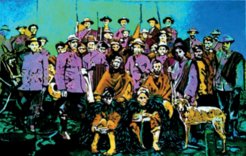
Finally, the study made a consistent effort of narrating the complex political lives of indígena leaders, their interpretations of law, and the double nature of the uses of law to emancipate and constrain. It also inquired into the ambitions of all those actors: their hopes and their visions for the future, their failures, their despairs and their mistakes in the political arena. The doctoral dissertation was successfully defended in June 2020.
Maysa Espíndola Souza
Doctoral Student
- Iberian Worlds
- Glocalising normativities (Joint Project)
- Between Roças and Palhotas: Colonial exploitation in Portuguese Africa, 1870–1930
Based on a comparison between Guinea Bissau and São Tomé and Príncipe, the PhD project Between Roças and Palhotas analyses how courts contributed to the production of norms during Portuguese colonialism in Africa. Colonial courts were fundamental in negotiating the concrete meaning of Portuguese norms that affected Africans and furthered Portuguese domination and the terms of asymmetrical dependency. By resorting to ‘colonial justice’ and accepting the Portuguese as mediators of conflicts, Africans in effect also acquiesced to colonial policy in this area. Initial research results suggest a different picture of interpretation from the classic analyses of the history of law by showing how colonial legislation was influenced by readings of legality, customary rights, negotiations and resistance. Such multiplex influences and interactions disrupt the narrative of European law being applied unchanged in the overseas territories.
The project’s main sources are court cases, government reports, legal doctrine as well as maps and photographs, which are analysed using the methods proposed by the social history of law. The source material comes from archives located in Guinea Bissau, São Tomé and Príncipe and Portugal and was collected during various research visits in 2019. Since then, the documents photographed in the archives have been transcribed and an extensive bibliography on colonialism and law in colonial spaces has been drawn up and studied.
The project is part of the Research Group Law and the Creation of Dependency in the Ibero-Atlantic led by Mariana Dias Paes. The discussions of sources and literature within the Research Group underpin the concept of asymmetrical dependency and support reflection on shared legal spaces. The research is therefore expected to contribute to the interpretations of the functioning of justice during colonialism in Africa between 1870 and 1930.
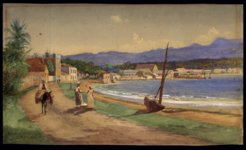
T. H. Walker (ca 1900), Baja de S. Tomé
Jeremias Fuchs
Doctoral Student
- Special Legal Orders
- Special orders of Catholic welfare in Germany in the 19th and 20th centuries
In the second half of the 19th century, the (regulatory) demands of the inwardly expanding modern state in Germany became a growing challenge to non-governmental institutions that had traditionally laid claim to regulate parts of society according to their own moral and normative concepts.
One area increasingly drawn into the sphere of public competence and legal regulation was the provision of social services and welfare. As a result of defining these services as of general interest (and thus a public task), the Reich, Länder and municipalities became actors in the area of public welfare, leading to a growing body of social legislation and associated public administration. The public sphere thus expanded its reach into an area that had traditionally been the monopoly of church organisations and religious associations, and that indeed was closely associated with the core of religious identity. This PhD project aims to investigate how Catholics as a social group created a specific system of norms that, driven by the need to defend and redefine their role in society, helped shape the dual system that remains characteristic of the German welfare state and its mix of public and private welfare institutions.
The study therefore examines normative sources that show how religious norms and interpretations of social phenomena such as poverty were translated into concrete normative texts that became part of a legal system, and explores where the framework of state legislation left enough space for private actors to fill according to their own normative ideas. In practice, it was texts such as the statutes of associations or house rules that regulated crucial aspects like the scope of benefits or the conditions attached to receiving them.
The project contributes to the study of the development of the German welfare state’s characteristic relationship between private and public institutions in the area of social service provision by examining the forms of coexistence and competition in this field, the alleged function of the private sector as a testing ground for the emerging welfare state, and the associated creation of non-state social law.
Damian Augusto Gonzales Escudero
Doctoral Student
- Iberian Worlds
- Glocalising normativities (Joint Project)
- The production of the colonial landscape of the lower Chillón river valley during the curacazgo of Hernando Nacara
A central – though often neglected – aspect of Andean legal history is how spaces were produced in colonial contexts, and the role that law played in this process. The PhD project The production of the colonial landscape of the lower Chillón river valley uses a specific case study from the central coast of the Andean region to explore these questions. The main objective of the research is to show how in the context of early colonial rule, the interaction – whether conflictual or negotiated – of an indigenous chief with both indigenous and non-indigenous inhabitants of the valley produced the landscape of the lower Chillon River Valley between the end of the 16th century and the beginning of the 17th century.
The primary sources for this research are mainly archival. From August to October 2019, a research visit was made to the Archivo General de Indias in Seville, Spain, to collect documentary sources for the project. These consist of litigation by the valley’s inhabitants in the local courts, reports written by royal officials during the Indian resettlement processes and composiciones de tierras (land sales), and the probanzas (testimonial evidence) presented by the actors who sought mercedes de tierras (land grants) in the valley during the period studied. The methodology is based on the analysis of the narratives elaborated in the sources in order to identify the normative knowledge that informs them. At a second level, the analysis of practices will allow me to identify the knowledge reflected in the performance of law.
In the context of the increasing move to digital communication during the COVID-19 pandemic, a short video introducing the project was produced, edited and published on YouTube (https://www.youtube.com/watch?v=1gkm1fDVdho) in June 2020.
Gilberto Carvalho Guerra Pedrosa Ribeiro
Doctoral Student
- Iberian Worlds
- Glocalising normativities (Joint Project)
- Decaying sweetness: differentiation and early modern citizenship during the Dutch intrusion in the Atlantic Iberian World, 1580–1674
The PhD project compares two frontier zones where Dutch and Luso-Iberian areas of influence and jurisdiction encountered each other: the state of Maranhão, located in the Amazonian region, and Congo and Angola, then jointly known as Central West Africa. The project seeks to address a number of questions about how different groups interacted and socially labelled each other, and whether there are discernible patterns of variability between the two situations of colonial expansion. Which basic normative concepts were more frequently invoked in those interactions, and what religious, political–legal guidelines of behaviour are expressed and were used by historical actors in everyday interactions? Finally, I ask to what extent the historical archives of the two colonial projects meeting in these frontier zones can usefully unveil mechanisms of inclusion and exclusion in the Iberian South Atlantic during the late 16th and 17th centuries.
The documentation of interactions among diverse historical actors, whether sustained or shortlived, constitutes the primary archive of this study. Without rejecting theoretical perspectives, the project proceeds inductively from an analysis of the empirical evidence and assumes that the dynamics of any given location were the product of multiplex interactions of local people, officials, missionaries, merchants, sailors, soldiers, travellers, settlers, and enslaved persons. In sum, the project approaches the precocious globalisation of the Iberian South Atlantic from a legal historical perspective. Moreover, the dissertation intends to contribute to the field of legal history by demonstrating how current normativities of inclusion and exclusion are best understood by examining the evolution of regimes of diversity from the past.
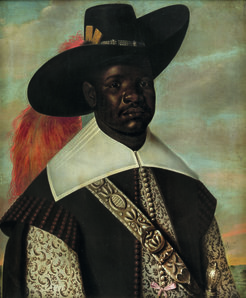
Jasper Beckx (ca 1643), Don Miguel de Castro. Emissary of Kongo
Karl Härter
Researcher, Research Group Leader
- History of Criminal Law, Crime and Criminal Justice
- The development of criminal law and justice in transition from the ius commune to the nation-state
- Political crime, legal responses and transnational criminal law regimes Transnational criminal law in transatlantic perspective
Activities and coordination of the three above mentioned, interrelated projects are embedded in an international and interdisciplinary research cooperation. Regarding methodology and overarching questions, the research explores the global dimensions and utilises the overarching concept of historically changing, flexible criminal law regimes to integrate the different approaches. The thematically varied individual projects investigate not only the multinormativities of criminal law – from penal codes to extradition treaties – but also include the discourses of criminology and the circulation of expert knowledge as well as the practices of criminal justice. This also extends to infrajudicial contexts and extrajudicial means of conflict regulation as well as to popular media that disseminated juridical knowledge and particular images of crime, criminal law and justice.
Within the context of the Research Field, a number of colloquia and workshops (mostly held at the Institute) were organised in which guests and cooperation partners presented related research and discussed their projects (see Annex). Contributions and resulting publications explore the influence of the French penal code on juridical discourses and codification in the early 19th century, demonstrating the legal transfer of criminal law as well as the emergence of popular media that should convey legal knowledge to a wider public (see the Annex for my own publications and presentations). Media and communication formed a specific culture of criminal procedure characterised by various forms of communication within different judicial and infrajudicial settings, and generated pragmatic and popular print media that disseminated legal knowledge as well as ambivalent images of crime and criminal justice.
Further studies on political conflicts / crime, legal responses and the formation of transnational criminal and security law regimes investigate the cultural and transnational dimension of criminal law and court practices. The contributions of an upcoming collected volume (ed. O. Danwerth, K. Härter) explore the transatlantic dimension of legal responses to violent political conflicts in the ‘Age of Democratic Revolution’, focusing on the comparison of Western Europe and Ibero-America. Three concluded dissertations (supervision K. Härter) provide additional case studies: R. Sirotti investigated the interdependencies of criminal law and political repression in the First Brazilian Republic (1889–1930) by analysing particular court cases, criminal proceedings and related press media. T. Hannappel studied the reactions of the German and European legal systems to political crime. Finally, C. Tyrichter examined the cross-border prosecution of political crime in the German Federation and the formation a transnational security regime that involved norms, discourses and practices which in general characterise the transnationalisation of criminal law. The results of the project are brought together in a volume that demonstrates the transnationalisation of criminal law in the 19th and 20th centuries for political crime, police cooperation, security regimes and normative orders [Härter, Hannappel, Tyrichter, Transnationalisation of Criminal Law, 2019]. Additionally, a soon-to-be published contribution for an international handbook demonstrates that norms, procedures and practices of transnational criminal law were rooted in the early modern ius commune and reshaped in the age of revolutions.
Research was further developed by the project Transnational criminal law in transatlantic perspective (with V. Vegh Weis), which explores the transatlantic dimension of transnational criminal law, focusing on the relations between and activities of European and Latin American actors. Initial results demonstrate that the circulation of transnational criminal law between the Americas and Germany manifested in various transatlantic extradition treaties, international discourses, conferences and associations as well as reconstruct the transnational dimension of positivist criminology as an intertwined network that disseminated concepts such as the ‘typology of criminals’, ‘dangerousness’, ‘social defence’, transnational penalties and measures of security to a global arena (see K. Härter, publications).
Li Fupeng
Affiliate Researcher / Former Doctoral Student
- Knowledge of the Production of Normativity
- Glocalising normativities (Joint Project)
- Glocalising ritual normativities
- Social revolution of the constitution
For more than 500 years, China and Europe have been in intense contact with each other. From the initial presence of Christian missionaries (16th – 18th centuries) to the violent conflicts in the period of Western colonialism since the mid-19th century, this contact also meant an encounter of both different world views and bodies of normative knowledge. In contrast to colonial narratives and paradigms, the projects carried out in the reporting period sought to explore different facets of this encounter.
The PhD project Social revolution of the constitution, defended at Goethe-Universität Frankfurt in June 2020, analysed the Chinese translation of the social rights of the Weimar Constitution (WRV). Based on a detailed analysis of the constitutional archives of the Chinese and the Weimar National Assembly, this project traced the entire trajectory and process by means of which the social rights of the WRV were appropriated, reinterpreted and transformed by Chinese intellectuals and politicians [Li, Becoming Policy. Cultural Translation of the Weimar Constitution, 2019; Duve, Li, Translating Weimar, 2019]. Furthermore, by using a Digital Humanities approach, this study mapped the frame of reference in which the Chinese constitutions were formulated, thus anchoring the paradigm of the WRV in the complex setting of foreign constitutions and national resources (traditional Confucianism and party ideology).
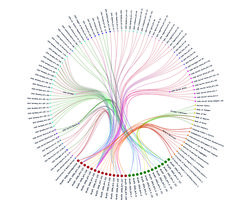
The ‘hierachical edge bunding’ (Holten 2006) visualisation has been suggested and created by the Max Planck Institute’s Digital Humanities coordinator, Andreas Wagner, using the graph-tool library
The postdoctoral project Glocalising ritual normativities, developed in 2020 and part of the larger project Glocalising normativities (see also Bastias), focuses primarily on the Chinese Rites Controversy, triggered by the Jesuits and the Dominicans. This project investigates the normativity of Chinese rituals by re-examining the normative sources from the Chinese texts (in the collection of the Vatican Library, Roman Archives of the Society of Jesus, National Library of France, Zikuwei Library, etc) combined with local case studies of Macau, Taiwan and Manila, all located along the border between China and the Iberian empires. The global-historical approach and the methods developed in the Department, such as multinormativity and translation, provide a promising framework for these activities. How normative knowledge is circulated, appropriated and translated, and how legal traditions and identities are reshaped has also been discussed in the working group Using normative knowledge from the past.
Bruno Rodrigues de Lima
Doctoral Student
- Iberian Worlds
- Knowledge of the Production of Normativity
- Archive, translation and practice: the legal knowledge of Luiz Gama
The legal knowledge of Luiz Gama (1830–1882), the – as far as we know – only lawyer in the Americas who had been a slave, is the central theme of this research project. Gama’s legal writings had a notable influence on the construction of civil rights in Brazil during the second half of the 19th century. Even today, his legacy remains alive in Brazilian memory. Using the methodological approaches of legal biography, microhistory and social history, the project analyses how Gama acted in the courts in more than 120 cases, most of which dealt with achieving free status for en- slaved people. What legal arguments did Gama construct, and what documents and other kinds of evidence did he use in his legal strategies to free the enslaved?
Based on a close reading of judicial sources, the project examines how Gama used the multinormativity of Brazilian legal culture surrounding slavery to create, translate and modify legal meanings, thereby producing original normative knowledge. The thesis draws attention to Gama’s legal strategies to achieve free status for his clients, explores how these were rooted in the categories of Portuguese civil law and political ideas of the Enlightenment, and compares his local experience with similar court cases in other Atlantic jurisdictions. Rather than investigating the heroic dimension of a former slave who obtained his freedom, the research addresses the question of how this former slave became a lawyer, especially given the fact that he had not attended law school. Gama fled slavery and served as a soldier for several years. After fifteen years of working in the police administration, he cleverly exploited a written norm and applied for the right to practice law despite not having a law degree. He acquired this right and became one of the best-known lawyers in the country. Gama’s actions in the courts helped approximately 500 illegally enslaved people achieve their freedom. By drawing on more than 500 archival documents, the thesis explains this achievement, unmatched in any other Atlantic slave society, from the perspective of legal history.
Mario G. Losano
Affiliate Researcher
- Knowledge of the Production of Normativity
- Entanglements between Italian and German legal scholarship in the 19th and 20th centuries
In the reporting period, a number of long-term research projects dealing with the interrelationships between different legal cultures were completed and their findings published. The focus was on a) the circulation of European legal ideas outside Europe; b) the reception of German legal ideas in Italy; c) the problem of peace in the three constitutions of the former Axis powers of Germany, Italy and Japan. In the first area, the Latin contribution to the modernisation of Japanese law in the Meiji period – already illustrated in three books on the Italian Alessandro Paternostro, the Portuguese Wenceslau de Moraes, and the Spaniard Enrique Dupuy, respectively – was extended to include the Brazilian contacts with Japan in the same era. The book I primi brasiliani nel Giappone ottocentesco was completed and is now in press at the Memorie of the Accademia delle Scienze, Turin (Italy). Regarding the second focus of research, the previously completed Italian translation of the second volume of Jhering’s Zweck im Recht was enriched by an introduction of more than 60 pages. This is the first complete translation into Italian of Jhering’s classic work. Finally, the volume on the three ‘pacifist’ constitutions of the former Axis powers was published in the mpilhlt’s Global Perspectives in Legal History series [Losano, Tre costituzioni pacifiste, 2020].
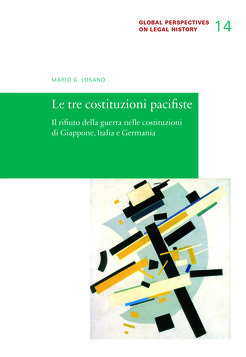
Juelma de Matos Ñgala
Doctoral Student
- Iberian Worlds
- Glocalising normativities (Joint Project)
- Dependency relations beyond slavery in Benguela from 1850 to 1878
The doctoral project Dependency relations beyond slavery in Benguela developed out of my participation (since 2017) in the project organising, cataloguing and digitising the documents of lawsuits in the archive of Benguela District Court (Tribunal da Comarca de Benguela, TCB) in Angola, conducted together with Mariana Dias Paes (mpilhlt) and Mariana Candido (Emory University). It aims to identify the dependency structures inside households (casas, defined not only as family but also as economic units) in Benguela by analysing inventories (collections of documents of a juridical-civil character intended to solve issues of inheritance and the succession of a deceased individual) and lawsuits regarding a person’s legal status filed, for example, by slaves, partners and patrons in order to challenge a certain legal status such as slavery. The two types of judicial process mentioned are analysed between 1850, the date of the oldest inventory process at the Benguela District Court, and 1878, the date of the definitive abolition of servile labour in the Portuguese Empire.
The project will analyse 66 randomly selected court cases. There is a gap in Angola’s historiography regarding dependency relations and the social and legal categories that structured them. The project is intended as a contribution to fill this research lacuna. In addition, court cases have not hitherto been used as a source to write Benguela’s history. This study will thus also introduce new methods and possibilities of research to the local academic community by fostering the usage of the TCB’s collection.
On the basis of the files that have been analysed and transcribed so far, the preliminary results of the research show that the legal framing of family relations inside the casas was grounded on ideas of kinship, protectionism, and friendship. Those affective relationships and issues of consanguinity appear in the court cases, demonstrating that the casas were not just social structures but also normative ones.
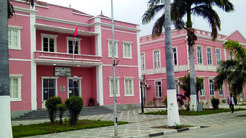
Building facade of the Benguela District Court
Massimo Meccarelli
Affiliate Researcher
- Special Legal Orders
- Diversity and regimes of normativity: pluralism and monism in the legal orders from the 16th to the 20th century
The purpose of the research project was to investigate links between the configurations of legal systems and forms of legal protection with particular reference to European legal thought of the 19th and 20th centuries. In this period, the issues of ‘diversity’ and ‘legal protection’ were related dialectically, as the concept of society assumed in the legal system, based on an abstract idea of equality between all members of society, did not reflect social reality. In order to analyse the contrast between the strong monistic setting of the legal system and the issue of diversity, the project considered the different functions performed by special legislation in social law (oriented towards the inclusion of particular groups or categories of people), criminal emergency law (directed towards exclusion) and colonial law (focused on anti-assimilation). This functional versatility of special legislation enabled the monistic legal system, despite its rigidity, to give multiple responses to the problem of diversity, without upgrading it to the rank of a structuring category. Special legislation functioned as an instrument to confirm the axiological function of legal monism and to legitimise its hegemonic potential in those situations that did not fit the universalistic program of equality.
A second subject of research focused on the development of legal thought during the early modern period, which, stimulated by the possibility of a New World, produced new theories in order to justify and support the enforcement of the European legal tradition also outside Europe. Against this background, the research considered the invention of individual rights as a tool to address the problem of generating community and social cohesion among people of very different origins and cultures. Finally, the project also addressed methodological issues related to employing global perspectives for legal history in the Italian and German historiographical contexts.
María del Pilar Mejía Quiroga
Researcher
- Curia, Canon Law and Moral Theology in the Modern Era
- Iberian Worlds
- Historical Dictionary of Canon Law in Hispanic America and the Philippines, 16th–18th centuries (DCH)
How did legal knowledge in the religious field translate into, and reproduce itself in, the particular socio-cultural contexts of Hispanic America during the early modern period? Departing from this question, the DCH seeks to show the various debates and normativities produced in the New World and to move away from Eurocentric and anachronistic perspectives on canon law by taking seriously the production of normative knowledge in both local and global contexts (see also Moutin).
The dictionary’s thematic articles are based on the analysis of a corpus of sources from a wide range of normative spheres (including moral theology, jurisprudence, legislation and customs). During the last three years, the first 50 articles of the DCH have been published in the Institute’s Research Paper series and on the project’s blog (https://dch.hypotheses.org).
A transversal reading of the published entries allows us to identify a series of important legal transformations that took place during this time. First, the acknowledgment of the particularities of legal actors (indigenous people, women, slaves, parish priests, interpreters, judges and procurators) led to processes of legal differentiation. Second, the intensive debates among theologians and jurists, mainly regarding questions of the clerical life and of marriage, especially among indigenous people, stimulated the rapid production of new legislation, both canonical and royal. Third, a series of legal institutions attained new meanings and uses; the study of their typologies allows us to understand how concepts with a long history could be applied to new circumstances, changing their classical meanings. Fourth, the versatility of legal knowledge is demonstrated by a whole range of legal institutions that were flexibly used by judges with greater discretion and according to the customs of local tribunals. The meanings of ancient and medieval legal concepts thus coexisted with new, modern uses in both judicial and extrajudicial contexts. Fifth, at a time of global debates between jurists and theologians, practical manuals of moral theology attained a new usefulness, as they were able to spread both theoretical and practical modes of reasoning even to the most remote territories of the empire.
I am the coordinator and co-editor of the DCH project and also coordinate the Research Field on the legal history of the ‘Iberian Worlds’. During the reporting period, my PhD thesis Restaurando almas supersticiosas: Prácticas procesales en el tribunal inquisitorial de Cartagena de Indias. s.XVII-XVIII has been prepared for publication and will appear in 2021.
Christoph H. F. Meyer
Researcher
- Curia, Canon Law and Moral Theology in the Modern Era
- Religious and Secular Legal Cultures of the European Middle Ages
- The status of the ‘infidel’ in pre-modern canon law
- Lombards and the Leges Langobardorum
- Generating knowledge of pre-modern canon law
During the reporting period, the first task was to complete the project The infidel in pre-modern canon law, which had been running since 2015 and was aimed at a bibliographic inventory and analysis of the literature on the history of non-Christians in the normative culture of the Catholic Church between Antiquity and the modern era (cf. Activity Report 2015–2017). Whereas the key results of the research were published in 2018 [Meyer, Nichtchristen in der Geschichte des kanonischen Rechts, 2018], the completion of the bibliography, arranged both chronologically and systematically, required more work than originally expected. It was finally published in 2020 [Meyer, Non-Christians in the Normative Culture, 2020].
Apart from this project, the phenomenon of epitomisation was the main focus of interest. After Antiquity, longer texts (e.g. collections of laws, legal literature) in law – as in other disciplines – were condensed into shorter versions or epitomes, for example to make the works easier to understand or to be able to reproduce them more cheaply. In legal historical scholarship, these processes have so far only been examined in isolated instances. It therefore seemed of particular interest to obtain an overview of the overall development of the phenomenon since late antiquity, focusing on the technique of epitomising and its significance for the dissemination of legal knowledge.
The study was based on the Latin tradition of secular and ecclesiastical legal texts and focused on Roman law for the first millennium AD and on the law of the Catholic Church for the second. In the course of the investigation, it became apparent that epitomising was by no means a sign of decay, as was sometimes claimed in older research, but could serve important functions in the development of law. This includes, for example, the removal of obsolete legal knowledge and the dissemination of legal information not only in schools and universities, but also to places far away from centres of learning.
In 2020, an English-language article on epitomisation was published in the volume Knowledge of the Pragmatici edited by Thomas Duve and Otto Danwerth [Meyer, Putting Roman and Canon Law in a Nutshell, 2020]. A significantly revised and expanded version of the article appeared in German in the same year [Meyer, Römisches und kanonisches Recht kurz und bündig, 2020]. Both publications are also the first fruits of a new, more far-reaching research interest that is being pursued together with other members of the Institute and is directed at the relationship between law and text in pre-modern times.
Osvaldo Moutin
Former Researcher
- Curia, Canon Law and Moral Theology in the Modern Era
- Iberian Worlds
- Historical Dictionary of Canon Law in Hispanic America and the Philippines, 16th–18th centuries (DCH)
The objective of the DCH (see also Mejía Quiroga) is to provide reliable information about the canonical institutions that were in force at that time based on the ecclesiastical and secular legal sources of this period. Contrary to the more typical alphabetical order, the contributions to the dictionary are presented following the order of the liber extra, which enables a better understanding of the forma mentis of the Indian canonist. Much of the information available in the current historiography is influenced by subsequent evolutions of the juridical institutions or ideological positions anachronistic to the period studied. As a result, one of the primary objectives of the project is to present the institutions in terms of the structure and argumentation found in a carefully selected doctrinal and legal corpus of sources. A scholarly reading of these sources requires both a reliable theological and canonical formation and the pertinent historical sensitivity in order to contextualise the information, detect doctrinal evolutions and create a sufficiently pedagogical presentation, especially for those in research fields who need scientific precision but have little to no experience with theology or canon law. Much of the work has involved supporting the authors of the articles to varying degrees, both on issues specific to canonical science and regarding the style of the project – a process that was both highly individualised and time-intensive.
One of the key initial results of the project is that it shows how the medieval forms of reasoning and models continued to endure while becoming increasingly outdated – if not obsolete – as time went on and unanticipated situations resulting from new missionary efforts were confronted.
Jorge Alberto Núñez
Affiliate Researcher
- Roberto Pettinato and the construction of Latin American penitentiary thought (1947–1955)
The research project on Roberto Pettinato and the construction of Latin American penitentiary thought is part of Max-Planck PICT project The travels of ideas about the criminal question to and from Argentina. Translation, contestation and innovation, 1880–1955, led by Máximo Sozzo (Universidad Nacional del Litoral, Argentina) and Thomas Duve (mpilhlt). Its main objective is to investigate the attempts to shape a penitentiary project that encompass the Latin America countries.
Roberto Pettinato, General Director of Argentina’s National Penal Institutions during the Peronist governments, can be considered a central actor in this context. By travelling to visit prisons in different countries, participating in penitentiary congresses, seeking technical advice and attempting to organise a Pan-American Penitentiary Congress, he constructed a network of experts that contributed to the creation and exchange of knowledge on the norms and practices related to imprisonment in various countries in Latin America.
The main features of Pettinato’s administration have already been analysed by renowned specialists who focused on the commonalities and ruptures with the previous administrations, not to mention with the positivist criminology paradigm of the late 19th century. This project, however, emphasises the ruptures of various characters‘ biographies, of the ideas and in the overarching penitentiary project.
Pettinato’s attempts to shape a Latin American penitentiary system must be analysed in the light of these ruptures and the break with a long tradition that had prioritised links with European countries. Based on both unpublished and edited sources, this project utilises the new methodological approach proposed by the Research Group.
During the reporting period, an article was published analysing the technical advice given by Pettinato regarding the construction of the Penitenciaría del Litoral in Ecuador [Núñez, La exportación del penitenciarismo justicialista, 2019]. In another contribution, the attempts to build a Latin American penitentiary system were analysed by comparing two different time periods [Núñez, González, ¿Hacia un Penitenciarismo latinoamericano, 2020]. Advances in the above-mentioned research and publications were presented at national and international congresses (see Annex).
Christian R. J. Pogies
Researcher
- Knowledge of the Production of Normativity
- The law of the sea in global history and comparative international law
Having previously worked as a student assistant on the Historical Dictionary of Canon Law (DCH) project and completed an MA in International Studies / Peace and Conflict Research with an emphasis on globalisation and law in April 2020, I am currently developing a PhD project. While the dissertation will be situated within the context of the research project Methods of global legal history, it is also connected with the working groups Regime theory and the Cross-Cutting Theme Using Normative Knowledge from the Past. The research focuses on the interface of the law of the sea, methods of writing global legal history and comparative international law. I am also a member of the Völkerrechtsblog editorial team.
The MA thesis operated with the hypothesis that international law contains not only mechanisms of conflict prevention aimed at safeguarding peace, but that structures of establishing new norms can also manifest, create or promote interstate conflict. Employing contestation theory, it examined the debate over the freedom of the seas in early modern Europe. The comparative history of the core works of the so-called ‘Battle of the Books’ identified the entanglements and interactions of the governance actors involved – such as publishing houses – and thus broadened the diversity of motives and circumstances that gave rise to new international legal norms. Moreover, the analysis enabled a more nuanced description of the norm-generative process between mare clausum and mare liberum as well as helped expand the common scholarly perspectives on the dispute.
Since international law and its newly developed norms were used to legitimise conflict and to make various claims against other international actors, the works published in the ‘Battle of the Books’ served as a shared language and a vehicle for communicating divergent interstate objectives. On another level, however, and despite the obvious differences in the legal arguments made by jurists and jurisconsults, the dispute ultimately helped to establish a new fundamental norm, namely the freedom of the seas.

Johan Loccenius (1651), De Iure maritimo et navali
David Rex Galindo
Former Researcher
- Iberian Worlds
- Knowledge of the Production of Normativity
- Franciscan missionaries and ecclesiastical normativities in New Spain’s northern frontiers, 1580–1630
The research project was part of the project Knowledge of the pragmatici and resulted in the publication of two book chapters. The first examines the role of local actors in the handling of resources in situations in which the opportunities for distribution are highly unequal [Rex Galindo, Kalfelis, Paz Nomey, Agency and Asymmetries, 2018]. When it comes to these situations, often described as asymmetrical regimes, it seems intuitive to show the distinctiveness of such asymmetries through the possibilities of actions on the part of the actors. The second essay explores the normative practices that emanated from religious authorities, especially with regard to moral theology, and the propagation and application of such religious normativities in a peripheral early colonial context [Rex Galindo, Shaping Colonial Behaviours, 2020]. The focus here is on the role Franciscan missionaries played in the establishment of ecclesiastical normativities in New Spain’s northern frontiers in the aftermath of the conquest (from roughly the 1530s until 1640) when, in a context of acute violence and only tenuous control by Spanish authorities, mendicant orders often were the only representatives of the colonial power in these regions. I contend that Franciscan missionaries actively participated in generating religious normative orders that – by relying on moral theology, catechetical and pastoral literature, indigenous practices, and orality – were part of the planned conversion of native peoples to Christianity and Spanish culture. The essay hence explores the creation of ecclesiastical normative knowledge and its practicality through confession and preaching.
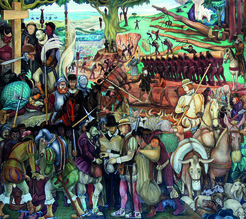
Diego Rivera (1929–1945), Exploitation of Mexico by Spanish Conquistadors
Ana Isabel Soler Otte
Researcher
- Curia, Canon Law and Moral Theology in the Modern Era
- Iberian Worlds
- Historical Dictionary of Canon Law in Hispanic America and the Philippines, 16th–18th centuries (DCH)

Screenshot DCH Blog
All contributors to the project Historical Dictionary of Canon Law in Hispanic America and the Philippines (DCH) (see also Mejía Quiroga and Moutin) are required to make use of a set of mandatory sources, with the possibility of adding further sources of their choice. Due to the interdisciplinary composition of the group of authors, some coming from legal history, others from canon law, others from social history, theology etc, some sources are better known to some authors than others. Moreover, as one of the major aims of the project consists in scrutinising possible localisations or regionalisations of the universal and particular canon law – or, in other words, the (cultural) translations or the inculturación of canon law – an adequate understanding and mix of local and universal sources is key for the success of the project. To ensure that the articles can meet these complex challenges, the Institute offers DCH authors research stays in Frankfurt, organises presentations and discussions during the writing period, and tries to establish an intense communication with and between the authors. After completion, each article is carefully revised, evaluated and returned to the author(s). As a member of the project group, I have mainly been involved in these activities. In this context, the authors’ blog set up by the team proved a valuable tool already before the pandemic, but has since become an indispensable vehicle for the exchange of ideas under challenging research conditions. It has enhanced pluriperspectivistic approaches and helped to enhance communication in this multidisciplinary community whose members are working on different continents.
Raquel R. Sirotti
Researcher / Former Doctoral Student
- The History of Criminal Law, Crime and Criminal Justice
- Iberian Worlds
- Glocalising normativities (Joint Project)
- Within the law: criminal law and political repression in Brazil (1889–1930)
- Producing modus vivendi: labour, punishment and governance under the rule of the Nyassa Charter Company (Mozambique, 1891–1929)
The so-called ‘long 19th century’ (1789–1914) was marked by a wave of political conflicts with global legal consequences. Revolts, rebellions, strikes and political assassinations boosted the use of repressive legal measures both at the national and international levels. Several studies have mapped the complex set of legal and extra-legal measures aimed at the control and repression of such events in distinct regions of the world, but little research has targeted the way in which political conflicts were addressed in the courts.
The PhD dissertation Within the law: criminal law and political repression in Brazil (1889–1930) addressed this research gap by analysing criminal court records representing prototypical cases of political conflicts in distinct courts and jurisdictions. The case-based examination of judicial sources uncovered the multiple uses of legal concepts and categories from codified criminal law, proving that the repression of political conflicts was not always carried by means of extra-legal measures. The dissertation was concluded in early 2020 and was carried out in the context of the Research Field The History of Criminal Law, Crime and Criminal Justice.
In January 2020, a postdoctoral project was started within the framework of the Joint Project Glocalising normativities. The study focuses on the rule of the Nyassa Company, a chartered company in Northern Mozambique during the colonial period, and seeks to explain the interactions between punishment, labour and governance in such a context.
Furthermore, the coordination of a collective volume edited by Thomas Duve and Tamar Herzog on the History of Latin American Law in Global Perspective was also initiated in early 2020 and is being carried out in tandem with the postdoctoral project.

Map of the territories of the Nyassa company, 1899
Philipp N. Spahn
Former Doctoral Student
- Curia, Canon Law and Moral Theology in the Modern Era
- The Bible as a norm? The struggle for the law of the church in the controversy literature from the time of the Investiture Contest, ca 1050 to 1140
Works on canon law usually spend few words discussing the Bible. However, neither the history of the Church nor its law can be fully understood if the reception of biblical texts in the ecclesiastical legal literature of the High Middle Ages is excluded in favour of papal decrees and canons of conciliar and synodal origin.
Although renowned scholars such as Peter Landau drew attention to this research lacuna years ago, it has not yet been filled. The aim of this PhD project was therefore to work out the significance of the Bible for the scientification of canon law, on the one hand, and the juridification of the Church, on the other. Both developments were decisively influenced by profound changes in the handling of texts from the second half of the 11th century onwards. These changes are particularly evident in the controversy literature produced in the context of the so-called Investiture Contest. These texts are perhaps the earliest testimony of a Western scholarly culture of dispute and represent an emerging body of ecclesiastical legal literature.
The authors of these texts strove to resolve legal issues through the harmonisation of discordant canons, and used new methods of textual analysis and interpretation aimed at ascertaining the correct meaning of their sources. Importantly, the key methodological innovations of the period regarding legal texts were also applied to working with the biblical text; for example, the form of biblical texts was used to determine the legal status of the norms derived from them.
Moreover, the new emphasis on, and methods of, working with the texts led to a paradigm shift away from custom (consuetudo) as a central figure of thought in early medieval secular law to the truth (veritas) as a significant figure of thought in canon law. In the historiography of the Investiture Contest, a tendency to focus on the historiographical narratives – in particular their descriptions of rituals – has led us to overlook the contribution of the associated controversy literature to the development of a scientific reasoning and methodology for the interpretation of sources in medieval canon law.
Valeria Vegh Weis
Affiliate Researcher
- The History of Criminal Law, Crime and Criminal Justice
- Transnational criminal law in transatlantic perspective (1870–1945). Towards a dialogue between the Global North and the Global South
- The transnational criminal law regime on the trafficking of women (1870–1921)
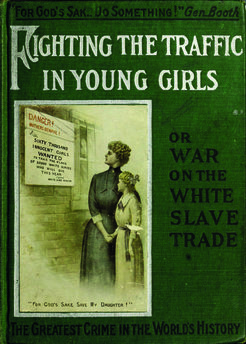
Herbert Booker (1910), Fighting the Traffic in Young Girls or War on the White Slave Trade
The project Transnational criminal law in transatlantic perspective, carried out together with K. Härter, focuses on the relevant relations between and activities of European and Latin American actors in the period between 1870–1940. The basic approach is to study states and experts from both sides of the Atlantic as actors in transnational criminal law re-gimes and in the global governance of crime. These regimes dealt with various activities that were criminalised or labelled as threats to public safety and the existing moral order — such as the slave trade, trafficking (both of humans and of drugs), smuggling, as well as political dis-sent/violence and illegal migration – and that affected more than one state or jurisdiction. The project investigates the transnational practices of mutual assistance, extradition and police co-operation as well as international discourses and organisations that dealt with related issues. Qualitative methods guide the research, though some quantitative data are taken into consideration. In May 2019, a first workshop explored the research area and methodological questions, including a discussion of concepts such as ‘transnationalisation’, ‘criminal law and security regimes’, ‘critical criminology’, ‘criminal selectivity’ and ‘global legal history’. Experts from Latin America and Europe presented exemplary case studies on crimes, criminals, actors and practices of transnational criminal law as well as on trans- national discourses and criminology. Several contributions are being prepared for publication in the mpilhlt’s Research Paper series. Further research results were presented in various Institute colloquia (two each in 2018 and 2019) and contributions to books and journals (see the list of publications in the Annex). Current research focuses on The trafficking of women within transnational criminal law regimes (1870–1921), studying Argentina (and, to some extent, Brazil) and Germany (and, to some extent, Austria). It is therefore conceptualised as a comparative case study of the Global South and the Global North. The project not only (dogmati- cally) reconstructs the provisions and norms and their implemen- tation in domestic criminal law, but also analyses the respective narratives, labels and modes of criminalisation that concerned criminal trans-boundary practices (‘kidnapping’, ‘trading’, ‘procur- ing’, ‘sexual exploitation’), the criminals (‘professional organised criminals’) and the victims (‘white women’).
Leonard Wolckenhaar
Former Doctoral Student
- Special Legal Orders
- Law and autonomy in German-language public law scholarship (Staatsrechtslehre) of the late 19th and early 20th century: discussing non-state law in the heyday of the state
The still dominant narrative regarding the discipline of Staatsrechtslehre between about 1871 and the middle of the 20th century attributes to it a monistically state-focused notion of law based on the dogma of the state’s inner sovereignty and monopoly of legislation. Nevertheless, as this PhD project shows, the idea that law could originate from different sources and be created by various actors was never entirely absent from academic debate. Even during the supposed heyday of ‘etatism’ between the foundation of the German Empire and the mid-20th century, the possibility of non-state law was discussed not only at the margins of the discipline but also in the context of several important fields of regulation, such as economic and work relations, the social services sector, the municipalities, and, of course, religion. Almost always, these discussions invoked certain vague but highly charged attributes of what (non-state) law should be: ‘organic’, ‘social’ or even ‘German’. Authors like Otto von Gierke served as much used – perhaps also misused – points of reference. Examining the discussions of non-state law in a number of sectors, the concepts employed, the relevant authors or ‘schools’ and their reception shows that the (in)famous German distinction between state and society was by no means clearly defined but rather highly con- tested. Such a comparative and historically contextualising analysis enables us to better assess the extent to which today’s discussions of concepts such as ‘transnational law’ or ‘legal pluralism’ in the context of globalisation are as revolutionary for the discipline as is often claimed. Even in the domestic context, non-state law appears as a latent but always present alternative, as the other side of the coin, so to speak. Moreover, in the late 19th and early 20th century, just as now, non-state law could not be discussed without also declaring one’s particular understanding of the fundamental concepts of law, state and society. The PhD project thus also aims to contribute to a more nuanced view of the development and role of these powerful concepts in our recent past.
Johanna Wolf
Researcher
- Special Legal Orders
- Non-state law of the economy. The normative order of industrial relations in the metal industry from the Empire to the early years of the Federal Republic of Germany
The aim of the project, undertaken together with Peter Collin, is to investigate the non-state order of industrial relations in the metal industry in Germany from the Empire up to the 1950s. The area covered by today’s labour law, the regulation of industrial production, has hardly been explored for the 19th century. The project will prepare a digital edition of normative texts and legal arrangements, including individual agreements such as employment contracts, internal company regulations (Fabrikordnungen, Arbeitsordnungen), collective bargaining agreements, company regulations with socio-political relevance (eg relating to company health or pension insurance) and statutes of employers’ and workers’ associations. The metal industry was selected as a case study due to its special importance for the industrial development of Germany and because the changes in the world of work during the period studied were particularly evident in this sector. The project has opted to define the sector broadly to include companies ranging from metal production and the manufacture of products to mechanical and vehicle engineering. The study focuses on a number of small-scale, sub-national spaces of interaction constituted by the density of traffic and migra- tion, communication and trade that were of particular importance to the sector, like Saxony, the Ruhr area (Ruhrgebiet), the region around Nuremberg and Fürth in Bavaria, and Berlin.
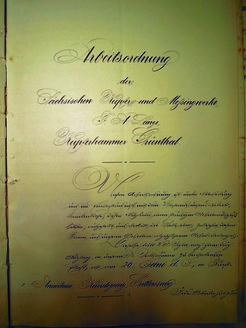
First page of the work regulations of the Saxon Copper and Brass Mills F. A. Lange, 1892
The project conceives of these non-state legal orders of industrial relations as an example of regulated self-regulation. This approach builds on the concept of multinormativity developed at the mpilhlt, and explores the relations between private and state law and their constantly changing interaction. It examines workplaces as special legal spaces in which a specific normative order was developed. Moreover, it takes up the idea of historical regimes of normativity by exploring the development of the normative order in industrial relations in a longue durée analysis.
My part of this project explores the genesis of work regulations (Arbeitsordnungen), particularly the debates and conflicts occurring during the negotiations. Work regulations are the only source of information on the normative order of factories available for the 19th century. They established the legal basis for industrial relations by defining working conditions and the behavioural demands made on the workers. The analysis sheds light on the actors – individuals, institutions and organisations – that played a role in the negotia- tion.
Alexandra Woods
Researcher
- Knowledge of the Production of Normativity
- Localising norms in the material
The PhD project Localising norms in the material aims to give a material perspective on the production of legal norms in the Cape of Good Hope in the 19th century. Specifically, it investigates the claim that the English common law doctrine of judicial precedent as it is understood today – the legal rule and practice of giving authority to past judgments – depends on the reporting and publication of cases. The project thus asks: to what extent and how did judicial precedent depend on the publication of case law books?
In the early stages of the Cape Supreme Court, established in 1828, law reporting was conducted at the initiative of private individuals and, as a result, was ad hoc and unsystematic. Before the publication of the first case law book in 1858, generally referred to as Watermeyer’s Reports, manuscript notes of the judges were circulated by practitioners and judges alike and used in their arguments. Methodologically, this project traces the development of the doctrine of precedent by looking at changes in both its definition and its use in the Cape Supreme Court as reported in the case law books. The project also researches the book history of these publications, exploring the connection between the development of the doctrine of precedent and the history of the printing press in the Cape. The initial results show that while there is no indication of the doctrine of precedent in Watermeyer’s Reports, a clear practice of considering and relying on past decisions is visible in the next publication ten years later, although the doctrine remained under-established. By 1882, increasing precision in how past cases were cited might signal a new concern for accurate reporting to facilitate their use as precedent.
As this project also considers how lawyers rely on the past to argue their cases, the activities of the Cross-Cutting Theme Using normative knowledge from the past, led by Thomas Duve and coordinated by myself, provide analytical guidance. Since January 2020, a working group on this topic has conducted seven workshops, and a working paper has been written which surveys this theme.
Multidisciplinary Legal Theory
Marietta Auer
The third and youngest Department, founded in September 2020, explores multidisciplinary approaches to legal theory. Its research focuses on conceptualising theoretical tools for an improved understanding of basic concepts and functions of law. The distinguishing feature of the Department’s research is a broad interdisciplinary, ie multidisciplinary, approach to theoretical perspectives on the law which include sociological, philosophical, historical, economic and other research dimensions. The three main Research Fields of the Department are as follows: first, multidisciplinary approaches to legal theory and particularly to private law theory as described above. Second, the Department conducts research on the theory, history and epistemology of legal scholarship. Third and finally, it welcomes and promotes all projects which concern the status, structure and social function of law in modern society.
Building up the Department
Since the founding of the new Department, I have invested considerable effort into building up an interdisciplinary research group to cover the thematic focuses within the scope of research outlined above. Several months into the Department’s existence, the growing structure is taking shape. Five objectives have been central for the selection of team members and the team building process:
Intellectual and scientific excellence and promise of all team members,
Diversity of the institutional structure and age distribution – with an even distribution of senior and junior researchers,
- Diversity of gender, languages and nationalities of team members,
Multidisciplinary diversity, including law, the social sciences and philosophy,
Synergies between the individual research projects and amongst the Research Fields in the Department.
I was able to meet all five objectives via the hiring process up to this point. As a first step, I filled the main administrative positions within the Department by hiring a highly qualified team assistant (Rita Besang) and a distinguished senior researcher in the social sciences (Christian Boulanger) who will also serve as the Department Research Coordinator. Christian Boulanger is a political scientist and sociologist by training and has brought several outstanding research projects to the Department. His projects, centred on the comparative history of the sociology of law and on Digital Humanities, also fit in very well with the research conducted in the other Departments of the Institute.
As of May 2021, Ralf Seinecke, another outstanding senior researcher, has joined the Department. I have known and worked with him for many years within the context of a mutual collaboration at the Justus-Liebig-Universität Gießen. He holds degrees in both law and philosophy. His specific contribution to the Department’s multidisciplinary focus is a crossover of legal history and legal theory focusing on theories of legal pluralism. With this research approach, he is in a unique position to foster multidisciplinary exchange within the Department as well as within the Institute at large.
The third senior hire is Johan Horst, who will join the Institute in January 2022. He holds law degrees from German and American law schools and has also studied history and philosophy. His research focuses on the relationship between nature and normativity in the age of shifting boundaries between both domains through man-made technical changes, and thus bears directly on questions of legal theory in the digital age and the Anthropocene.

On the level of junior postdoc researchers, I am currently conducting interviews with several interesting candidates, among them three women whose research takes up different perspectives on the theory of property and inheritance.
Six new doctoral researchers have joined the Institute since last September. Of those six, two are currently pursuing LL.M. studies at American universities, one of them at the Harvard Law School. Another doctoral candidate is currently pursuing his postgraduate legal clerkship in Frankfurt and is thus working at the Institute on a part-time basis. Two of the dissertation topics are centred on law and logic, another three are dealing with the structure of legal doctrine, judicial law-making, legal hermeneutics and extra-legal arguments in the law, and the final one is researching the history of the idea of contract law. The contracting process with a seventh doctoral researcher from China is still pending. Her research will focus on a comparison between digital contracts in China and Germany.
Finally, I am expecting two academic guests at the Department as of January 2022. One is also from China and joins the Institute with a postdoctoral project on pre-contractual reliance. The other is a senior scholar at the professorial level from Brazil and is directly researching the possibilities of a multidisciplinary theory of law. It is worth noting that the new Department has attracted a great deal of attention from researchers interested in legal theory in Germany and from all around the world. More than 150 applications for the doctoral and postdoctoral calls for posi- tions were received, and the overall high quality of the applicants meant that many suitable candidates could not be accommodated. In the meantime, the Department has taken up its academic work, including regular biweekly meetings and presentations of scholarly work by its members. After its dynamic launch, I am confident that the new Department will develop into an international hub for multidisciplinary theory in the years to come.
Personal research agenda and achievements
Since starting at the Institute in September 2020, my own research agenda has undergone a visible shift. The focus on multidisciplinary and international theory is much more pronounced, and the scope of international and interdisciplinary subjects of legal theory has become even broader than before. At my previous posts at the universities of Giessen and Munich, my research was always still somewhat focused on doctrinal German law. Since joining the Institute, however, I have used the freedom this new position offers to fully concentrate on the specific projects con- nected with my appointment. The institutional dynamic of the growing Department further highlights this development.
In this period, six law review articles and one book chapter have appeared in print (see Annex). I have written another four articles which have been accepted for publication in high-ranking, peer-reviewed law reviews, history reviews or collections of essays. My most recent work focuses on topics such as the history of ideas of legal theory, the epistemology of legal scholarship in the work of Carl Schmitt, the concept of paternalism in private law, and the intellectual genealogy of complexity. Moreover, I have written several book reviews, among them one longer review essay developing a comparative history of legal scholarship using the example of the Harvard Law School, and another one dealing with postmodern legal theory and legal aesthetics.
I also presented several digital talks and participated in digital panels since my arrival at the Institute, for example, on autonomy in the digital age (Polytechnische Gesellschaft, Frankfurt am Main, December 2020), on property and restitution to the former German imperial family Hohenzollern (Bundestagsfraktion Bündnis 90/Die Grünen, February 2021) and on the history of private law scholarship since the 19th century (Universität zu Köln and Universität Bayreuth, April 2021).
In addition, I have continued my widespread institutional activities as a board member and evaluator within numerous national and international scientific institutions and societies (see Annex). Furthermore, I am a member of the board of editors of several law journals and book series in the fields of legal theory and private law (Grundlagen des Rechts, Mohr Siebeck; Fundamenta Juridica, Nomos; Rechtsgeschichte and other book series edited by the Institute, Klostermann). Within the Max Planck Society, I am currently serving as a member of the appointment commission for a director position.
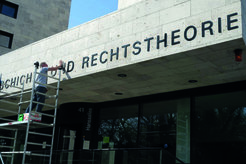
My future research plans include two book projects on the aesthetics of law and on the relationship between concepts of property and concepts of family. My new position at the Institute has put me in a unique position to pursue these projects. Both books require an exceptional degree of interdisciplinary research and intellectual effort that I could not possibly have invested as a law professor at a German university. Thus I am confident that the ongoing development of my new Department will also enable me to pursue my personal research agenda on a level simply not possible outside of the Max Planck Society.
Christian Boulanger
- Theory of Legal Science and the History of Legal Scholarship
- Socio-legal trajectories in Germany and the UK
- A history of the sociology of law post 1945 in German-speaking countries Legal theory graph
Three projects are currently in development that share an interdisciplinary approach to legal doctrine and its ‘other’, the non-dogmatic study of law. The approach combines perspectives from the social sciences and legal theory to explore law as a social practice, including legal research and legal education.
The first project is a bi-national research project that investigates why the intellectual and institutional developments of Socio-Legal Studies in the UK and Rechtssoziologie in Germany have turned out so differently. Whereas Socio-Legal Studies are firmly established in UK law schools, Rechtssoziologie remains marginalised in German law curricula. The project Socio-legal trajectories in Germany and the UK will be undertaken together with Dr Naomi Creutzfeldt (University of Westminster) and Dr Jen Hendry (University of Leeds). It employs comparative and empirical methods alongside self-reflective socio-legal theory and will collect comparative data on the respective institutional landscape and history of the disciplines in the two countries as well as on the academic identities and biographies of scholars in the field. The project aims at enriching our understanding of key actors and events in the development of the non-doctrinal study of law in the last decades [Boulanger, Comparative Sociology, 2020; Hendy, Creutzfeldt, Boulanger, Socio-Legal Studies, 2020]. It will also be conducted together with the Department of Stefan Vogenauer.
The research literature and empirical data collected for the comparative project will subse- quently be used in the writing of a monograph on the post-1945 history of the sociology of law in Germany, which will focus in particular on the 1960s–1990s and the struggle between doctrinal and non-doctrinal approaches in German Rechtswissenschaft. A key aspect will be the analysis of the central yet often undertheorised role of Rechtsdogmatik in German ‘Legal Science’.
In addition to these projects, which use traditional humanities and social science research methods, a third project employs methodologies based on network graph technologies, bibliometrics and corpus linguistics. The Legal theory graph project, which is currently in an exploratory phase, aims to produce publicly accessible linked data on legal theory scholarship (with a focus on socio-legal theory), mapping scholars, institutions, publications, and citations in a network. The project profits from existing expertise at the Institute in the application of Digital Humanities research methods to legal history.
In my role of Department Coordinator, I am working with Professor Auer to create the intellectual environment and infrastructure that will allow the Department’s staff to produce excellent interdisciplinary legal theory scholarship in the years to come.






















































